#now while i am very critical of this episode in this post i will acknowledge potential outside factors that could be responsible
Explore tagged Tumblr posts
Note
WFA opinions? Love Barbara standing up to Bruce
Ough. Bruce defenders fighting for our lives with this one.
I really like the beginning. We don't usually get nice caring moments between Bruce and Babs (specially not mundane peaceful ones), so I wish that the opening was just a little longer to give us more of that before the fight. I like how Barbara points out that he's treating her like a Robin even though she's basically her own hero who just works with Batman.
I think they're trying to ride a line this season between comic Bruce and the slice of life dad Bruce they set up over the last two seasons and this episode is a particular stumble imo. Blaming Babs for Dick's injuries just doesn't feel super in-character with this version, even if I see what they're going for. They do let him have good talking points, some of which really do sound like they're being said by Bruce Wayne.
Not sure how I feel about Bruce trying to shut down the clocktower. That's something he usually relies on pretty heavily, and shutting it down would only put Babs and his family in more danger. And like I said, she's basically a separate superhero and he's making claim over her stuff. Like how is he gonna force her to leave. They gonna fight? Is he gonna blow it up? Idk. Unfortunately, it does feel like something mainline Bruce would do, and I'm not sure how I feel about that.
This was a very good Barbara episode, but Bruce's character struggled a lot here. She feels right at home in both her normal and WFA characterization while Bruce feels split between the two in a way that just kinda leaves me feeling weird about this one.
#also the art in this one took me out#the random dramatic anime shots of Bruce and Barbara's ever changing head size just kept making me laugh#and why did Alfred look so disturbed in that cliffhanger#wayne family adventures#batman wayne family adventures#batman family#batfamily#bruce wayne#barbara gordon#dc comics#now while i am very critical of this episode in this post i will acknowledge potential outside factors that could be responsible#i know there's been some shit going on with webtoon that i haven't looked into too much#so I'm not trying to be too harsh#dc#webtoon
22 notes
·
View notes
Note
I still like TOH, but your comments have made me notice something about reviews praising it: namely, a lot of the elements praised are specifically described- Belos’s character, Luz’s depression, the dark themes, the serialization, etc- as being amazing for a kid’s show, and I think that’s a factor in why critical reviews tend to match fandom opinion. Namely, kid shows having understandable limitations leads to attempt at darker themes/big stories being praised as standouts as long as the execution is competent enough to not be noticeable. So while some people do acknowledge TOH’s flaws, they point out it’s still admirable the show made the attempts it did, especially with Disney’s public stance on what it pushes for in its cartoons.
So... I want to be kind first before I somewhat lose it because I am so SO TIRED of it being stated that TOH is different from other kid's shows. The Owl House is perfectly competent and entertaining in just its base elements. The animation is good, the voice acting is amazing, the feeling of teenagers is well captured, it's a lot of fun when it's interested in being fun and S1 has a lot of great ideas that earn a lot of good will with an audience and the plot line with Eda in S1 is genuinely amazing. After all, usually you don't have a character who is actively dying.
A theme they never actually address in detail. Eda doesn't feel like she's being held back by the curse very often and there's even one episode where it's used to re-enact a family guy episode of King trying to murder a toddler who won't let him be ruler of the playground. That... Isn't serious. In anyway. It's only serious when it's first revealed and the big sacrifice moment. After S1, it's barely a thing outside of Keeping Affearances.
This is the fundamental problem with The Owl House... And why it's so easy to praise. Yesterday I talked about how it screams its themes at the top of its lungs. How it is very blunt about how it wants to be perceived. Whether this is perception is earned or not is secondary to what it can easily state.
Which makes making an online article about how it's so different from other kid's shows, how it's the kid's show for those who don't like kid's shows, very easy. If you don't actually know much about kid's shows and how shit like Static Shock way back when was already addressing racism, having serialized content, etc. like that.
I mean, if we look at recent kid's cartoons, we have Steven Universe and Steven Universe Future. Gravity Falls. Amphibia does a lot of the same themes as TOH, with honestly about as much meaningful serialization, but also while being good, consistent and enjoyable. It earns its themes... But you have to dig for them.
So why have to scrape the barrel when the soapbox preacher is right there? This is part of the character arc problem too. Do you know how EXHAUSTING posts about "Look where they were and are now" by the end of S2? Where Amity would be a distinct, interesting, unique character in S1 but all they care about is that now she SMILES!
If you don't actually have to talk about the substance of her arc, if the show actually tackled any of its potential, complications, etc like that, it looks impressive. Then you talk to them about Winging it Like Witches or Understanding Willow, both frankly very much so kid's show episodes that something like Danny Phantom, My Little Pony, or Kim Possible would have and could have done, and suddenly it sounds less impressive, doesn't it? Not when you're describing episodes where Amity's past doesn't match her introduction at all and are obviously wiping away what makes a character arc interesting for "SHE'S ALWAYS BEEN GOOD! It's not her fault."
Sure. That's why she was willing to kill someone who didn't even lower her grade but instead just got someone else to be praised. And that's still S1.
Luz's depression is similar. You can have her make big statements that sound like they may imply she wants to die but they're still not willing to use the actual terms. Have Luz only suffer the absolutely loudest but worst stereotypes of depressed people like being constantly suicidal, pushing others away and not caring about them. 'But it's depressi-" No. As someone literally crippled by it, I don't want it being used as the excuse for literally the worst thing Luz does in the whole series, which is to just abandon an entire world to whatever fate she claims to believe she inflicted on it. I myself and a lot of other depressed people will tell you that it is FAR easier to help others, especially if you've hurt them, than any sort for yourself. But Luz's depression is used as an excuse for her to claim to keep caring about others when she is actually only serving herself and lying constantly to everyone around her while doing it. If that's great, depression representation, something most kids are still going to miss what it is, then fuck that noise.
But depression is a big topic right now so going "DISNEY'S FIRST MAIN CHARACTER WITH DEPRESSION!" sure is a headline, isn't it?
And let's quickly talk about the fact that TOH is very morally weird. It's not willing to do many big lesson episodes, hence why Episode 2 stands out so much to me, and a lot of its main cast has dubious morality. And... Then it doesn't really touch on morality either. It has no interest in it, even to the point of bad actions maybe getting a line or two said about them but then moving on.
As an example: Amity just wants to invade Luz's privacy. Period. She has Luz's phone and wants to be given an excuse to look into it. Talking to Willow, they could have a very real, very human conversation about how Amity's parents have taught her that such measures are okay because trust doesn't matter as much as control and how that's not okay. It could be a genuinely very adult moment for the series and maybe even have Willow talk about how Luz finding out so much about her past during Understanding Willow makes her uncomfortable sometimes because even if nothing bad surfaces, that was information given. By making all that a real conversation, which yes would have taken more time but let's face it, TOH honestly doesn't spend enough time setting its characters morals and letting them have conversations where there's real conflict between the two. And none of this is explicit or so dark or so boring that there's no reason a kid's show couldn't have it.
And do you want to know what you gain by making it a conversation like that? A real lesson to kids. A lesson that will prepare them for not only their own loves but for just how to handle others in general. TOH is still a kid's show after all. It should in theory be considering its audience and while not talking down to them, remembering they do need to still bring them into the conversation.
OR, YOU KNOW, HAVE WILLOW SHRUG AT THE QUESTION! And I could do a full breakdown as to why that's a real, human reaction to that question, even for someone like Willow. But I have to bring the real world, my life experiences, my sister's life experiences (and she's 30 while I'm almost 27) in order to explain why Willow is not blatantly being a TERRIBLE person by not calling Amity out.
And yes, that's when TOH is at its worst. It commonly just brushes off immoral behavior that isn't the end point of the plot as just a thing happening, like how Edric and Emira don't actually suffer consequences for their plan against their sister or how Luz is made to feel bad for stealing Amity's wand but then isn't attacked by Amity but put into a protective circle by her. A time out, sure, but one that leads to the ice glyph and her getting to save everyone.
A kid can learn the wrong lessons by the lack of consequences in the show and they're not going to learn a lot of good lessons from what is there. There's a reason why kid's shows are blunter than other media and they have morals. They're remembering that, especially in our modern age where one income households just DON'T EXIST that they have to pick up the slack and modern cartoons are doing that better than old 90s cartoons.
But do you know how much TOH reminds me of older cartoons like the 80s or 90s? With their villains who are evil for the sake of evil? With characters that can change on a dime, or the blatantly comic relief ones who don't have much character outside of that? The plotlines that are more about spectacle or statement which led to all those terrible PSA cartoon moments? Or hell, with how Amity ended up: The character who is blatantly only there to be the pretty girl that gets with the main character?
That's the thing: You want to say TOH is better than Teen Titans Go? Fine. That is obviously true. Who actually cares about and is praising Teen Titans Go though? When you compare it to the shows that people do praise, like Amphibia, Gravity Falls, etc., shows that not only teach and make kids better but also tell an engaging, full story with real themes, characters, developments, etc... What does TOH actually have? How much more serialized is TOH than say, the first season of My Little Pony? There were two episodes of build up for the Grand Galloping Gala before the finale and in TOH S1, you technically only need to see The Intruder and Covention, besides the pilot obviously, before you will understand almost everything going on in Young Blood, Old Souls and Agony of a Witch. There's more in S2 but most people agree that it's done competently at best, which is why people keep screaming about the shortening and I made an entire blog pointing out that S2 is bad because... The show is bad about serialization effectively.
And as a final note: I lived with a Star Wars and Star Trek fan for two years at the peak of Discovery being out and as wind up for Rise of Skywalker was going on. I lived on their couch and when they put on an almost 24/7 reel of 'reviewers' for these franchises, I heard a LOT of shit takes. A lot of the same shit being repeated with no real thought behind it, it being what was popular said (which goes into what makes people popular online versus being a mouthpiece for the popular opinion) and showing no thought or care about the actual system of production for things or the people behind it. A lot of people just blaming issues on one creator, or praising a single creator for all the good in something without talking about why they were attributing the problem to them. And yes, I know how hypocritical all of this is coming from some white dude on the internet no degrees, experience, etc like that. I just hope that my blogs show a little bit more real thought to storytelling to make it not as bad.
So a show where the popular, fandom consensus is that it's amazing, it states its themes making 'deeper' analysis easier and is very loud about its statements like they're original is going to be very popular to this type of review. Does this mean it's all disingenuous? Of course not. I started this blog by saying a lot of the reasons why the show is easy to like. Does it mean it has none of the depth people give it? No because a show trying this hard is going to manage successes sometimes though a lot of the times it then shoots those successes because it doesn't realize it's doing them.
But this statement that it is somehow better than things that have come before, is somehow truly groundbreaking while shows clearly paved the way for it so that it's just at the front of a wave it didn't have to make, and ignoring its flaws for all of these reasons, especially with "It's special because it's on Disney" or "It's only bad because of the shortening" is... REALLY tiring. To put it mildly.
A thing should be good because it's good. Not because it says it is or because you have to put modifiers on it to make it special. Shrek was groundbreaking not because it was made by someone other than Disney. It was groundbreaking because it genuinely looked at how it could parody the landscape around itself while making a genuinely good adventure and love story. Did it help that the creators wanted to give a middle finger to Disney? Maybe but I don't have to bring that up with what makes Shrek amazing. I can just say it's very good. In or out of its time.
The Owl House will only become increasingly less special and interesting as time moves forward and its big statements have to be yelled louder and louder to be properly heard. =======
I have a public Discord for any and all who want to join!
I also have an Amazon page for all of my original works in various forms of character focused romances from cute, teenage romance to erotica series of my past. I have an Ao3 for my fanfiction projects as well if that catches your fancy instead, If you want to hang out with me, I stream from time to time and love to chat with chat.
And finally a Twitter you can follow too!
68 notes
·
View notes
Text
me in my feelings about trek fandom:
so, that star trek confessional blog that's been going around the last few days? and the mini discourse about possible rage-bait on it? and then the new rule that they won't post anything that feels like it's attacking a specific subgroup of fandom? That whole thing?
Cursed discourse. Rotted, rancid, stupid shit. And not even the top five worst discourses I've seen this week.
I actually kind of am mad at a lot of trek fandom and do have a lot of honest opinions that would read as an attack on people...
I guess the thing that has been rising to the top is this phenomenon where people who are clearly intelligent and thoughtful in terms of how they engage with stuff in general end up having bizarre blindspots when it comes to trek.
People who thoroughly acknowledge cultural biases and the ways in which opinons are shaped by bigotry when it comes to talking about how, say, Voyager was received at the time, will turn around and flatly deny the roles of racism, misogyny and transphobia in the reception of Discovery, insisting that "it's bad because grimdark" - which a) isn't even true and b) a cursory glance through the comments on a stream of a disco episode would prove that "grimdark" is not the thing that audiences are mad about. You might have a good faith criticism (which "grimdark" isn't because it's not accurate, but idk some other good faith criticism) but that's not why the show is less beloved than snw or picard s3.
Or people who constantly reblog posts about how episodic "filler episodes" are so great, and how they build the characters and make up the heart of the shows... and then talk about characters and their relationships in ways that only make sense if you cherry pick random disconnected moments from across seven years of television.
Or someone how can talk articulately about fandom culture, stanning, and conspiracy theories, and shows insight and cynicism into phenomena like those sherlock truthers... and then says that garashιr would have been canon if it weren't for ezri, or that it would've been canon if they'd got an eight season. Like, these are ridiculous opinions that basically rely on you not watching the actual show.
Ok technically the last two were just me bitching about a ship that's popular and therefore sometimes the fans can get obnoxious. I shouldn't complain about that... while we're here, I also find spιrk annoying at this point. This is silly, back to snw.
Fundamentally, a lot of snw's popularlity is the same as picard s3: it's nostalgia heavy and the leads are white men. Overall, taking the entire audience in mind, that is a significant part of what's going on.
Now, obviously, snw is a lot better than s3 of picard (which i will die mad about). It's not a bad show, but I do feel that s2 didn't really improve on s1 and perhaps felt weaker at times. I thought the musical episode was genuinely bad and struggle to even believe people when they say they liked it. To be clear: I love musicals, I love musical episodes, I hated this one.
It's shit like this, the insistance that it's amazing when, as a show, it's just fine, sometimes a little bad, mostly pretty good, occasionally very good - it's shit like this that makes people accuse fans of being inauthentic when they praise it. It's claims that snw is "saving nu trek", when no, no it hasn't. Discovery has been prematurely cancelled, Picard ended in disgrace, and Prodigy was cancelled, then rescued but its future past s2 is unclear. It didn't save anything.
It feels like the future of trek is going to be more naval gazing, more nostalgic pandering, more meta references and a distinct lack of new concepts... possibly even a lack of new characters at this rate.
I made this side blog to post about picard s2, because I genuinely had a lot of feelings and thoughts. I felt like, while there was some annoying shit and bad takes around, it was fun to participate and I was enjoying myself. For the last few months, really since snw s2 aired, I've been having a pretty bad time here. So much of it is petty shit that sounds bizarre to type out: small posts and variously tiny infuriating takes. This entire post is stupid and pointless, when I put it like that.
But, yeah, trek fandom has been making me pretty unhappy recently.
I'll still be here and will watch the new disco when it comes out, and hopefully feel something again. I want to be able to re-enter the headspace I was in back when S2 picard aired, and I felt free to just express my opinions without being hyper aware of everyone else's pre-conceived stuff. We all have loaded opinions and strange baggage with trek, it comes with the territory.
4 notes
·
View notes
Text
Final Fantasy VII: Machinabridged Episode 6 Review
Originally posted on November 5th, 2015
The one where Cloud actually crossdresses.

So two weeks ago I talked about how Final Fantasy VII: Machinabridged has shown the extent by which Team Four Star has grown, especially in regards to their handling of representation of the queer community, and how Cloud’s crossdressing arc showcases the utmost respect they have for trans and gender nonconforming folks. And this episode is no different, with Cloud’s crossdressing only being seen as degrading by one character, and praised by the rest.
Now, if you’ve been following me for a while (or read my last review of FFVII:MA), you’ll recall that the first time Team Four Star had a character make fun of a masculine woman, I was very critical, pointing out that being demeaned is something that trans and masculine women are forced to deal with on a regular basis.
I also argued that in the context of the show, having the only masculine woman be treated this way during the only time she is asserting her proper gender feels more like the intent is to make fun of masculine and trans women in general, rather than being the bit of representation they likely intended.
With FFVII:MA, however, Takahata101 seems to be going out of his way to assert something different: namely that trans and masculine women’s genders are valid, and it is only reasonable to treat their gender as such.
With that in mind, Tifa making fun of Cloud for crossdressing works, because it matches the cruelty and emotional carelessness of her established character without being the only voice we hear speaking of Cloud’s crossdressing.
The Church of Brodin has been more than supportive, a group of Chip ‘n’ Dale dancers gladly gave Cloud panties, Giuseppe is more proud of Cloud than his own son, and Aerith has been nothing but supportive since the beginning. And to top that all off, not even Don Corneo rejects Cloud upon discovering his true gender; if anything, he seems more excited once he knows the truth.
None of that is to say that this episode is perfect, of course. It suffers from some pacing issues, which is par for the course when Team Four Star is dealing with slower and calmer material. In particular, the scene in the “sex dungeon” feels slow, and while the slowdown is necessary to develop character (and expand upon Aerith’s innocence and jealousy), it feels like a significant shift both from the rest of the episode and the series as a whole, in regards to both pacing and tone.
The tonal shift in that scene might pay off later, of course; it could easily be a sign of the kind of moments we can expect to see in the future, and if that’s the case, then it means Takahata101 is working to overcome Team Four Star’s weaknesses in slower storytelling.
Rating: 4/5
If you enjoyed this review, consider supporting me on Patreon.
Stray Observations
Cloud: “One drugs, please.”
Cloud: “Grapefruits and three bras.” *sigh* Rookie mistake, Cloud. Everyone knows for a quick and dirty breast form you use nylon socks filled with grain and tied shut.
Cloud: “You don’t want me. I’m a virgin!” Poor, sweet, little Cloud, unaware of predators love for innocent prey.
Before I close, I want to take a brief moment to talk about the importance of representation. To do this, I’m going to take a small tangent. Back when I published my review of Dragonball Z: Abridged Episode 15, not long after KaiserNeko decided to reblog it and spread it, I received a message whose sender I am making anonymous, and in it I was asked “who are you and what makes you think Team Four Star needs to pander to tumblr gender politics.”
Well, sender, the truth is, I am but a humble critic, and my personal reasons for wanting to see proper representation of gender nonconforming folk is not a sufficient reason for them to want to do better (well, it kinda is, but I’ll get to that). There is, however, a sufficiently compelling reason for them to do so, and that reason is respect.
By acknowledging criticism of their representation and working to better it in the future, Team Four Star shows that they have respect for their viewers that they may have misrepresented, and for the actual experiences that they must go through every day. “Tumblr gender politics” in general is based upon this same notion, and through efforts to raise awareness about what these people’s experiences are, they imply the need for respect of their person, and show the harm of disrespecting someone’s identity.
The next question you might ask, then, is why I personally care so much about this notion of respect, and specifically how it relates to the treatment of trans and gender nonconforming women. And the answer, reader, is pretty damn simple: I’m a trans woman.
#ffviima#final fantasy vii machinabridged#final fantasy vii#final fantasy 7#ff7#ff7ma#final fantasy 7 machinabridged#film criticism#ffviima ep06#well i wasn't expecting this!#didn't realize that i actually properly came out in one of my reviews#pretty neat though :)#other than that i think this review is solid#and cloud is a trans woman#fight me
12 notes
·
View notes
Text
The Herc and Linda Meta: What’s Up With These Two, Anyway?
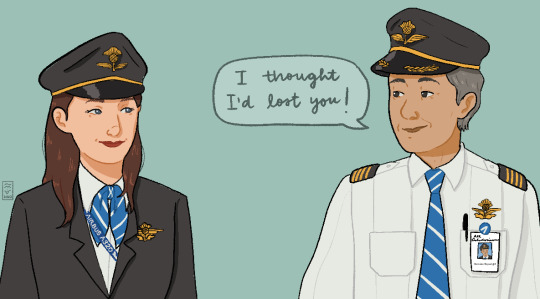
“Every series, it seems,” Mang Juan wrote on his blog in 2011, “one episode causes me more trouble and hair-tearing than any two and a half of the others combined. […] This series it was Newcastle.” Though three years later, he would partially recant his judgement on the matter, concede that Newcastle was “a good introduction” for Herc Shipwright, and accept his pacing of events, it is a truth universally acknowledged, that even self-decreed flops conceal the biggest of slays.
Mang Juan wrote after Newcastle had aired in 2011 that its difficulty had to do with the sheer amount of information that he had attempted to cram in, and that Herc Shipwright and Linda Fairbairn’s flight deserved a separate episode. Though some of Herc’s most memorable character traits (including his fear of sheep) are only revealed in subsequent episodes, I believe that Newcastle alone is ripe with details and implications that make it possible to extrapolate more about either character, but especially Linda. Moreover, these same details make it possible to form an interpretation of the duo’s dynamic that is congruent with information provided later, as well as narrative themes and motifs.
Under the cut, this will be explored in the following parts.
“Old Friend Of Mine from Air England”: Herc Shipwright, or A Study in Minding the Gap
“The Plane-Spotting Pride of Penicuik”: Who is Linda Fairbairn, Anyway?
“The Best Candidate For the Job”: Putting Everything Together (I: “The Wee Scottish Airline”; II: Shipwright & Fairbairn)
1. “Old Friend of Mine From Air England”
I have said it before, and I will say it again: pilots do not make lateral career moves unless there is a very, very good reason for doing so. Herc Shipwright must have had a very, very good reason for forsaking a job at an implied flagship airline for a position at a much smaller one.
But before we speak more about (as of Newcastle) Cabin Pressure’s newest recurring meow meow—gentlemen, a brief diversion.
Airline Structure: Not Your Garden Variety Corporate Ladder
This section is based on five years’ worth of research, at least of two of which were owing to the fact that I wanted to become a pilot myself and thought I should know what I was getting myself into. The only reason this changed to engineering was that 1) I couldn’t afford ground school and 2) I am 150 cm tall and had a very rude awakening when I realized I could not, in fact, see over the control panel of an Embraer 175 while sitting in the first officer’s seat. The following is based on what I’ve gleaned from articles and forum posts over those years.
Commercial airlines, as the title of this section states, do not work like many companies. God knows why. (There are reasons, most likely, but they’re irrelevant to the scope of this write-up.) Since Ernest Gann was staunchly criticizing the very similar predecessor to the current system in 1961, I’ll just say it’s probably precedent.
In an airline, seniority is everything. When one is hired, they receive a number. This number determines a lot: the likelihood of them getting their first choice of a route (or “line”), how soon they can “upgrade” (upgrade = become a captain), and importantly—their job security. If things go south at the airline, the last through the door are the first to be asked to leave. If this sounds harsh—Yes. It is.
Even more (and this is crucial to understanding Herc, but we’ll get to that soon), seniority does not transfer between airlines. A brief example: if one is a captain for the A380 at British Airways, and decides they now want to work at—let’s say—easyJet for whatever reason, they cannot take their accumulated seniority from BA with them. They must start over again at the bottom.
This is why, historically, when pilots are hired at an airline, they expect to stay there for the rest of their careers. As Beyoncé once said, “If you liked it then you shoulda put a ring on it.” This isn’t the case all the time; plenty of regional carriers are often a pilot’s first step before going to the major airlines. Some have even collaborated to set up contracts and training programs that offer a path to the major airlines for young pilots through regional carriers.
Now, a relevant caveat: There are ways for someone with previous captaincy experience to, while still giving said pilot a low place in the seniority list, nevertheless hire them as a captain. This is called “direct hire,” and it happens if there are not enough first officers at the airline eligible to upgrade, or if the airline is expanding too quickly to upgrade the first officers it already has.
This brings us back to Herc Shipwright.
(End of diversion. Snack break!)
From the details we get in Newcastle, it appears that Herc Shipwright, despite every single warning to pilots ever made to focus on building seniority, has somehow managed to successfully execute a lateral career move at his age and stage. For starters, he’s a captain. Actually! That’s the single, biggest, most important thing. After enough of a career at Air England to build seniority and bulge logbooks, he makes the move to Air Caledonian and we meet him in Newcastle as a line captain. Since one cannot transfer seniority, something else has probably happened. It is likely, then, that Herc himself (on merits of his prior experience, and possibly, need) was a direct-hire captain.
But why? Why leave a much bigger, seemingly more prestigious airline for a smaller one that Herc essentially likens to a flying bus depot by the end of the episode? (Although, he’s probably somewhat bluffing in context; otherwise, why would he try to get Arthur Shappey a job at Air Cal?)
I—and my betters—have chosen to conclude that this is where Douglas Richardson comes in.
Perhaps Martin Crieff may have seen his hopes for networking go swirling down the drain when Herc and Douglas started chanting at each other upon first glimpse. And of course, there’s Herc and Douglas’ joshing over opera during the delay in Birmingham. But it’s the one scene in which these “old friends” are alone together, where Douglas is expecting something, and will take anything Herc will wanna give him, baby—Sorry. My bad. That’s Mitski.
Within the context of Newcastle, there is a certain tension in the way Herc and Douglas interact in that little exchange which adds an intriguing depth to the “old friend” moniker. To begin with, Douglas’ posture here is a subversion of what the audience has come to expect from him. It’s Martin who we’d expect to be the opportunist when it comes to career moves (easyJet, easy go…) But rather than taking Martin’s approach to Verbal LinkedIn, Douglas approaches a monumental shift in a pilot’s career as a favor to be begged of someone in a higher position than he. One has to feel for the desperation, knowing that he’s even pretended to be a captain for his now ex-wife, and knowing in context of the airline industry that Douglas is taking a huge gamble: he probably wants a low-seniority, high-rank treatment akin to what Herc has most likely gotten. (Funnily enough, if it was Herc copping Douglas’ act—Douglas is hoping to cop Herc’s here.)
But how does Herc react to this, probably knowing Douglas enough to anticipate what is going through the other man’s mind?
He coolly rebuffs him. And as Mitski so eloquently puts it, Douglas takes it, and retreats.
My betters have long touched the scorched ground at this point and murmured, “Something terrible has happened here.” I agree. We know that Douglas has had a severe fall from grace, losing the security he gained from working at Air England by his own fault. The question is, why did his “old friend” leave too? My betters have postulated that whatever caused Douglas to fall so far, Herc must have played some role in it, and come off better. He still leaves Air England, but he’s not the one knocking on the window asking to be let into Air Cal.
This has been an oft-explored concept; it meshes in so well, I even had to ask a friend who’s been into the show for far longer about whether it was actually written in or had just been extrapolated. (Okay, but I can at least pull the card that I was a kid and definitely not thinking about this show when Newcastle aired.)
We know why Douglas left Air England; he was forced to. But why did Herc leave, and how did he manage to stay within enough good graces that his experience would likely be considered as a factor when he was hired at Air Cal? He is a pilot, a long-established member of that workforce. He cannot plead ignorance about the ramifications of a lateral career move. Perhaps whatever he did to play a role in Douglas’ expulsion did affect Herc’s reputation at Air England, and he had no choice but to move somewhere that probably wouldn’t know him as well. After all, as this noticeably English man tells Douglas, “you don’t have to be Scottish to fly for a Scottish airline.”
Ouch. That would probably hurt even the most emotionally fortitudinous person.
And so, the question arises: what happened to Herc between what most certainly would have been a deeply traumatizing departure/life change and the incredible, amazing, show-stopping, never-the-same positioning flight he takes in Newcastle?
I think now is a good time to talk about his co-worker.
2. “The Plane-Spotting Pride of Penicuik”
Her name is called eight times in the episode. She utters 39 lines in the whole show. And she’s struggling to fully grow out of her father’s shadow.
Linda Fairbairn may not have been in Cabin Pressure for a long time. Maybe it wasn’t a very good time, either. (To be fair, there was no way her experience could top the very good time her co-worker had in this episode. Anyways.) But the little she says is a veritable treasure trove of characterization that—over a decade on—remains tantalizingly ripe for the picking.
From the moment she walks in, the audience is made well aware that First Officer Fairbairn is not a woman to be trifled with. After Martin Crieff unwisely makes an outburst at the apparent subversion of his expectations (namely, that he’d be encountering two male pilots he could potentially call co-workers, if he can get a foot in the door), the door has barely closed behind her colleague before Linda rounds on Martin and pointedly mimics his exclamation. This same defensive-to-the-point-of-aggravated posturing is all too familiar to any person in a field where they are a minority, but Linda’s righteous indignation strikes a particularly resonant chord with those who present and/or identify as female in a “male-dominated field.” (Sidenote: There is another character who, in this episode, similarly reacts in a similar situation. But we’ll get to that later.) It is no surprise, then, that this encounter has immediately set her up to treat Martin with suspicion, as she admits to doing by the end of the episode. This is only exacerbated by Martin’s failed attempts to question her about her (already gender nonconforming) hobby of rally driving, which only escalates the issue until he manages to poke the sleeping dragon that is Chief Pilot Fairbairn. This, above all, is what truly sets Linda off. “I can excuse you blundering your way into microaggression,” she essentially says, “but I draw the line at bringing my Dad into this!” Up to this point, every patient dealing with Martin has culminated in what can only be characterized as an explosion. Her patience has been worn thin; it is obvious that Martin, however inadvertently, has managed to hit a very sore spot.
Which brings us to what is the most interesting and ironic part of her character: Linda’s relationship with aviation. She may be utterly vehement toward the idea of her father having anything to do with the career path she has taken, but the truth is that her father probably played the largest role in her life’s path—by being the reason she’s into aviation at all.
From the beginning of Newcastle, Linda displays a knowledge and passion for flight that enthralls even Martin, who is the show’s epitome of a flying fanboy. She’s a line pilot herself—a profession which, in general, one has to like to be able to do successfully. She’s been in the skies for twelve years. She can identify MJN’s rare plane on sight. When they land in Birmingham (it’s the tiniest of details, but it’s there!) she even questions the engineer about G-ERTI’s state. This is not a woman who resents what she does or is only in it for the “glam factor.” Most tellingly, she literally tells Martin (to humorous effect when he tries to relate and she tries to work in a tease) that she’s been at it since childhood.
At this point, there can only be one explanation for this long-established love affair: Chief Pilot Fairbairn.
Now, hearing the emphasis with which Linda declares that her father has had nothing to do with her employment—and by extension, the path of her career—it would be easy to arrive to the fallacious conclusion that Linda resents or dislikes her father. But since Linda is at the very least implied to be a competent pilot (she’s still in this industry after twelve years, she insists that she was the “best candidate for the job” and—one does have to be good at flying and have potential for leadership to be hired at an airline, however ‘wee’), it would be safe to assume that she’d have gotten a job with any of the other airlines in the British Isles or even on the Continent (of course, barring existence of any financial crises or world events in-universe that would override any push factors for migration). It does not make sense for Linda to have a lifelong passion centered around the profession her father holds, enter that same profession, and work in the same company as her father—if she did not have a good relationship with him.
Ah…fathers.
Out of the range of fathers and father figures presented in Cabin Pressure canon—from the truly horrifying to the mellowly disapproving, the well-meaning but frustrated to the one who can solve anything, and of course the concerned and genuine one who needs no blood relation to have and express his love—there are not many notable examples of a father-daughter relationship being portrayed. The closest we get to this is Douglas’ relationship with his daughter(s): there is enough contextual evidence to at least suggest it’s not the greatest, which my betters have proposed. Even Theresa of Liechtenstein (who parallels to Linda in some ways) only speaks of her father in context of a joke about his desperation for a male heir. (Booooo, agnatic primogeniture! It’s the 21st century!) Linda’s relationship with her father, as implied through what she reveals and what can be inferred, is then one of the best examples of a relationship between a parent and child in the whole show.
Linda has a father, whom she must love dearly; and yet, she is adamant of her self-determination, explosively so. In combination, this is a woman who is sincerely cherished by a father she both loves and whose lengthy shadow she longs to escape: a delicious tension for a character who only appears in one episode.
May I remind the reader that this was taken largely—if not solely—from Linda’s 39 lines in Newcastle. What a picture these 39 lines paint!
Her appearance in the show, however brief, nevertheless continues to raise questions: about the aviation world in which the show is set, Linda’s career proper, and the crucial question addressed in the title of this write-up. I’ve been teasing about these questions for too long. It is now time to address them.
3. “The Best Candidate for the Job”
I. “The Wee Scottish Airline”
In the same way that Newcastle’s wealth of detail provides insight into the individual characterizations of Herc and Linda, it is also possible to make reasonable inferences—based on what is given in the episode—about what kind of an airline Air Caledonian is.
Hints about Air Cal begin early, with the whole premise of the episode being a positioning flight for a crew on standby or reserve over a relatively short distance—from an airport within the vicinity of Fitton (most likely Bristol, as one of the designated alternates to Fitton) to Newcastle. The proximity of the two locations might indicate, at first, that Air Cal is a small, regional carrier—but this theory is refuted by Herc describing his aircraft as a “bus” to Douglas by the end of the episode. Granted, it is possible to call anything bigger than G-ERTI a bus. But Herc’s description would ring most honestly (and sardonically) if Air Cal takes a niche similar to a low-cost airline like easyJet, Ryanair, WizzAir, or even Jet2; if Air Cal operates single-aisle, narrowbody twinjets on short-haul routes around Europe and to seasonal destinations.
Air Cal doing long-haul does not make sense in terms of Herc or Douglas’ characterization. Both men speak of Air Cal as if it were a “step down” from Air England. It is difficult to glamorize or romanticize a several-flights-in-one-day lifestyle, jetting off not to some distant land but a city that’s probably a few airspaces away. Yet, it is still a well-known airline, enough for Carolyn to reference it in jest and speak of their passengers as “proper pilots”—much to Martin’s consternation! Adding prior evidence to support this claim, Martin has already applied to easyJet (mentioned in Boston). If he’s trying for Air Cal now, it would be safe to guess that this airline is similar, lying in the middle between a small regional carrier and a long-haul flagship airline—a budget airline that flies short-haul.
We’ve been able to take a few guesses as to the corporate side of Air Caledonian. Now, we ask the question: what’s it like to work there, anyway? To answer this, we return to Linda Fairbairn.
As was explored in Part 2, Linda has probably heard everything about her father and would certainly rather not hear more, please and thank you very much. One can only imagine a tight-knit working environment at Air Cal, where people know each other well. Linda herself must also have been well-known in that kind of a community. Being the daughter of the Chief Pilot, it wouldn’t be a stretch to theorize that Linda must have been the subject of a fair bit of teasing from her colleagues. That could help to explain the explosiveness of her reaction to Martin. Linda’s only just met the man and she automatically thinks that he’s in on the joke too! It’s a cute image (and probably even more annoying to Linda) to think about, nevertheless—Linda growing up in and around Air Cal as her father builds seniority and eventually earns the title and responsibilities of Chief Pilot. Imagine, if you will, the possibilities for Take Your Child to Work Day! Add to that the detail that she’s certainly spent her childhood in a pre-2001 world (if Newcastle does take place in 2011)—now imagine, if one will, a young Linda essentially growing up in the flightdeck whenever she wasn’t in school? I’ll wait a second for the Awww’s to subside. Okay, okay. Now imagine Linda’s dad presenting her with the Air Cal wings when she was hired…
Hey, it’s a good time to talk about Linda’s career. (If you know me, it’s actually always a good time to talk about Linda’s career!) Linda says she’s been a pilot for “12 years,” and if she is around Martin’s age (who was 32 in Helsinki. Give or take a couple of years, we’ll say he’s 34 in Newcastle) we can subtract back to figure out when she got her license. Given that she’s the daughter of an airline Chief Pilot and has harbored an affinity for aviation since childhood, it would be no surprise if she wanted to get licensed as fast as possible. So 12 years subtracted back can put her very neatly into the minimum age at which a pilot in the UK can hold a license (21 years old). That checks out.
12 years still seems like an awfully long time in an easyJet-type airline where many of the pilots’ goals include moving to bigger airlines with prospect of more experience and pay. And in Linda’s case, she would probably want to minimize any notion that her father is playing favorites during the hiring process. So let’s shave off four of those years, and devote that to Linda building up hours to make her case to the Dad-less selection panel. (Maybe this is also where her rally driving begins, too!) That gives up to eight years thus far spent at Air Cal when she walks through the MJN office door in Newcastle.
That’s still a long time. Eight years—and she’s still a first officer? Considering the probable business model of Air Cal, Linda should probably be at least a junior captain by now! What if Linda wants to be exactly like her father—in more ways than just the general profession? What if she’s fully expecting to build a career at this one airline: to quote Dan Fogelberg, be “a living legacy to the leader of the band”? That doesn’t match well with her clearly expressed eagerness to live outside her father’s shadow.
There are consequences for delaying an upgrade that can, and do, have material effects on a pilot’s life. There’s the financial aspect: higher pay. The seniority factor. The ability to have and execute command. Linda is giving up all these things by not electing to upgrade, and they are not mere trifles. What’s more, she absolutely cannot plead ignorance of these realities of her industry. For better or for worse, she grew up the daughter of her company’s highest-ranking line pilot. She has undeniably seen first-hand the importance of seniority. She must know that an eligible and qualified pilot (which after eight years, she must be) cannot waste time refusing to make the switch.
There must have been a very good reason for Herc to leave Air England for Air Caledonian. Likewise, there must be a very good reason for Linda to delay the advancement of her career.
We now approach the last part of this write-up, which I believe to be the apex of this whole affair.
II. Shipwright & Fairbairn: The Bestieworstie Case
If there is one single, overarching argument that I believe Cabin Pressure posits, it is that the end of all things is love. To extend, this love is then a unitive force—and how many times does our author make it so clear that the unitive force between his characters far, far outweigh their intensely varied and at times clashing backgrounds and personalities? It is what makes this story so resonant, especially and particularly among those who are yet to experience that genuinely unitive force in their lives, who are yet to find the true community that is built off of that force and not false, superficially unitive forces.
As has been previously proposed, Herc Shipwright must have come and was broken by such a “false” community. After years spent most likely copping Douglas’ act at Air England, a messy end has driven him to a downgrade of an airline, where he barely knows a soul and probably feels excluded due to his age, generational difference, or other factors.
Linda Fairbairn could not have come from a more different background. Linda is apparently cherished and has been introduced to a lifelong passion by a man who commands respect from others—due to his position, but most likely also to his character. She follows this man to this airline that’s probably been a major player in her whole life, but maintains a keen sense of self-determination and agency.
It’s been about eight years, and now, these two very different characters are being positioned together on a charter flight to Newcastle from an airfield that isn’t too far from Bristol, the major airport where Air Cal has perhaps set up a base. They get out of the car and take out their flight bags, squinting across the car park at the smaller airline’s little office. Linda spots a plane, parked at stand, that catches her eye; she wanders up to the fence to have a look at it. Maybe Herc shakes his head behind her, smiling, and enters the office in full trust that she’ll follow him in. And Linda does, maybe after taking a quick photo of G-ERTI.
When she opens that door, Herc is standing there, all relaxed confidence and practiced suavity: with a very affronted woman, two pilots who couldn’t look more different if they’d tried, and a slightly younger man who looks very happy to be there.
And Herc looks at her, and tells her with a smile shining through an incredibly affectionate tone— “I thought I’d lost you.”
This is literally their only documented interaction in the whole show. Yet, this—and the earlier conclusions I have drawn from the rest of Newcastle and using details from other episodes—was and is enough for me to beg another question, the same one that titles this write-up.
It is also enough for me to propose an answer. I argue that the gap between Herc’s departure from Air England and his appearance in Newcastle did not stand empty, and that it provides hints as to his journey as a recurring character to Zurich. I argue that Air Caledonian was what filled not only that temporal gap, but the emotional wounds Herc likely had as a character. Most of all, I propose that in keeping with Cabin Pressure’s exploration of the definitions of family and expression of love in its truest form as a charitable, unitive force of will, it is not only justifiable but logical to extrapolate that a friendship between Herc and Linda existed beyond what is presented in the canonical storyline.
By the time Herc is hired at Air Cal, he has been married four or at least three times (as we find out later in Vaduz). It is safe to assume he is not a father; not once does he mention children, estranged or otherwise. It is also safe, as outlined earlier, to treat Herc as being hired in the midst of a massive midlife crisis—or at least a sharp reckoning of his life choices. Imagine this man getting paired up to fly with this kid with huge starry eyes about the profession, who’s ostensibly doing what she’s dreamed of since childhood. And what if they keep getting paired together, to justify the familiarity in Herc’s tone in Newcastle and the fact that, were it not for Herc and Carolyn’s ongoing argument, she’d stay in the cabin with him? I propose it would have been Linda who made the choice to stick with Herc. He probably fully expects this young woman who’s been raised by a loving, respected, incredible father to want nothing to do with him and the sordid details of his past. But she stays—again, as has been explored, she has no shortage of aspiration but is stuck in a position where people know her probably a little more than she’d like. Wishing to grow out of the shadow of her father, and maybe feeling awkward about getting close to captains she’s probably known from a young age, Herc is a logical person for her to turn to. Someone new, who knows enough to know that Fairbairn = Chief, but not enough to have seen her grow up.
Herc, then, becomes a sort of proto-father figure, no matter how much he might want to be an actual father figure at this point. Linda, if we can be reminded until my face turns blue, already has a father. And yet, as Herc is the newcomer who does not have enough knowledge of the company to remember a younger Linda, she would most likely be least apprehensive to turn to him for advice and know-how when it comes to aviation matters. This would mean something to both of them; I propose this is what could have sparked a friendship.
Additionally, Linda demonstrates a parallel to another character, whom Herc also comes to like, that might support the argument of her and Herc getting along and becoming friends—Carolyn! Both Linda and Carolyn, when aspersions are perceived to be cast on their capabilities as women in similarly “male-dominated” fields, respond aggressively. That is to say, to quote the way a longtime friend once eloquently put it, Herc seems “utterly enchanted by the powerful and terrifying women around him.” (She has more to say about this than I could suitably put it without having to cite literally every other line, so all I can do here is raise a glass to her.)
Lastly, postulating a friendly/mentor-mentee/slightly paternal dynamic between Herc and Linda can provide clues as to Herc’s further journey to Zurich. While Linda cannot honestly and truly be the daughter figure Herc might deeply desire at the beginning of their acquaintance, there is a character who neatly fits into that niche: Arthur. In their first meeting, Herc is so impressed by Arthur’s character that he offers to use ways to find employment with him at Air Cal! (Sidenote: Mang Juan wrote in his outline for Newcastle that Herc “knows [the] Chief Pilot.” Yeah...that’s his bestie’s dad.) And indeed, as the characters progress through the show’s canonical narrative journey (of course, sans Linda) the audience comes to understand that Herc is the father figure that Arthur deserves: I argue that on Herc’s end, he realizes that he does not have to be a universally respected or idealized figure of strong character like Linda’s father probably is (and that has possibly caused him a lot of emotional distress in the past, considering the desperate state in which he makes his career move). He must realize, at some point, that the important thing is for him to be: to appreciate and cherish the Beloved how they are, as they are. Such is the definition of a true, charitable love. Postulating a previous history of such a relationship between Herc and Linda would then anticipate Herc’s relationship with Arthur later on.
Conclusion
Newcastle is one of my two favorite episodes of Cabin Pressure (it is tied with Vaduz for the top spot!). With its wealth of detail and the implications that these details present, it is a deeply intriguing episode that—while probably not entirely faultless—poses many questions about two of the characters presented therein.
I have postulated that the evidence presented through Newcastle’s treasure trove of detail can be used to propose a possible interpretation of the temporal gap between Herc Shipwright’s departure from Air England and his appearance in Newcastle. I have used the details given in Newcastle to outline the backgrounds of both Herc Shipwright and Linda Fairbairn as they arrive in the episode; to propose an explanation for the business structure and company atmosphere at Air Caledonian; and to argue that interpreting a dynamic of friendship between Herc and Linda is not only compatible with the information presented canonically, but compliant with the themes and canonical narrative arc of the show itself, as it explores love as an action; it argues for love as an act of charity and force of will toward unity.
I have been thinking about all these points for at least a year. In preparing to compile my thoughts into a comprehensive argument, I was surprised to learn that Newcastle was, apparently, not universally enjoyed in the same way as I had come to enjoy it. I could not disagree more with that sentiment! Newcastle proposes implications that can be extended, which can explain and enhance what is already there.
We have only to draw it out.
#cabin pressure#em writes#meta#herc shipwright#linda fairbairn#passing out actually#this is four thousand words long.#under the hood
18 notes
·
View notes
Text
Hahahaha multiplication I am so fucking lost
Ok so let’s go we’re doing this
Episode starts with Ladybug and Chat Noir looking for Felix, good job for using a braincell bestie, also why are the Astro costumes so sparkly bro?
People are for some reason still forgiving and supporting ladybug (bitch why?! She fucked up so bad and y’all doesn’t even have the “complex” context to it!) and Chloe and Lila are demonized (Chloe is right to criticize Ladybug tho)
(Also Su-Han was such an afterthought to justify Ladybug, he’s right to be furious)
And Marinette… well. I don’t really know how to feel about her still.
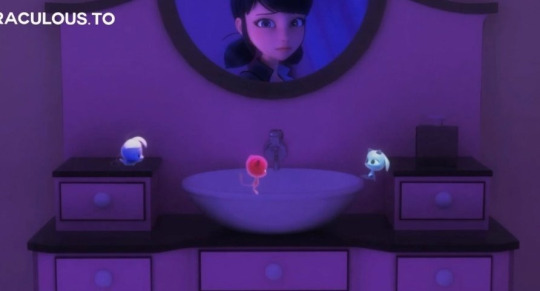
Like I know most people who actually know my opinions of her would think “isn’t this what you wanted? She’s feeling guilt about what she did and trying to move on!” And in that regard, yeah! I am glad that she’s acknowledging that she fucked up miserably and that its all her fault and that she should have done better and let go of her obsession with Adrien, but that’s just the thing
She’s blaming it all on her “love” for Adrien.
This show has a big thing with phrasing, which I never really liked, and while I’m glad Marinette’s finally trying to move on, it feels:
1. shallow (I’ll link my post about her breakdowns and feelings of guilt here, but I still don’t trust her to actually move on, I’m afraid I came across the spoilers for season 5, and she goes back to stalking real quick)
2. Wrong? Like it often feels like whenever Marinette says she should move on it’s not “I can’t function around him I’m fucking crazy” it’s “oh he’s so dreamy I can’t help but be in love with him Alya he’s too perfect I canttttt”
3. Like it’s the wrong thing to do! Everyone is moaning and crying over how “Nooooo you should keep at it honey you got this we love you you deserve Adrein as yours noooo” to make the viewer feel like maybe Marinette and Adrien being apart and not a part of this toxic ass stalker relationship is bad!
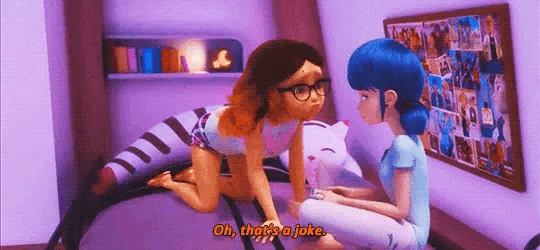
And with Adrien…
Listen first of all, I would like to congratulate the Love Square shippers, and specifically Adrienette. I know this is what a lot of people have been wanting from day one and I’m honest to god happy for them! Having ships come true and such always makes people happy! You guys deserve nice things and I really hope this time around, this ship won’t be dragged out to long.
I personally tho? Am not as thrilled, because of the context behind this love square finally coming together.
With Marinette’s constant stalking from day one, Ladybug’s treatment of Chat Noir, Chat Noir being initially very obsessed with Ladybug, and now Adrien being obsessed with Marinette? (Like seriously man, The entire thing with Adrien trying to kiss Marinette’s cheek and Alya trying to hold her so he would kiss her have me such creepy energy and like “no but she wants it!” And like??? NO????? BESTIE NO ALYA STOP MARINETTE SHOULD HAVE THE RIGHT TO SAY NO)
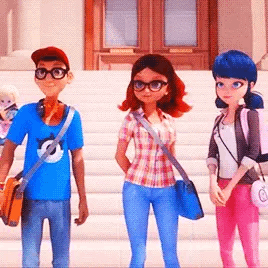

This entire ship has been dragged out for so long and is so unhealthy from both sides (personally I think it’s primarily from Marinette’s side, because she was legit breaking the law or being a really shitty toxic hypocrite, but Adrien is no saint either, never really trying to move on except for season 4, to only now latch onto another person for approval, god I hate it here) that even if on paper, Marinette and Adrien are developing, the tone and background to this ship has kinda ruined it for me
For me, even if right now, they come together in a healthy way (which I’m not even super sure about, Marinette goes back to stalking and viewing Adrien (just like she views Chat Noir now apparently) as an idea/an object of desire for her use, and Adrien is just making the same mistake he made with Ladybug with Marinette! this ship is forever really unhealthy and toxic for me
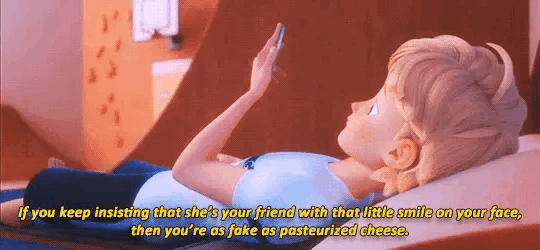
(Plagg sweetie not you too)
Personally, I still side with Adrien more, as he is again! Given more shit for his bad behavior, gets more mistreated and sidelined by the plot, has a really fucked up childhood that somewhat explains his behavior, and is not a criminal who could be arrested for breaking and entering MARINETTE, but again! Both are really bad
Anyways now that this tangent and my stance on the love square has been made clear let me real quick list everything else out:
1. Natalie my goddess my queen kill your husband and take your boy with you away from Paris please
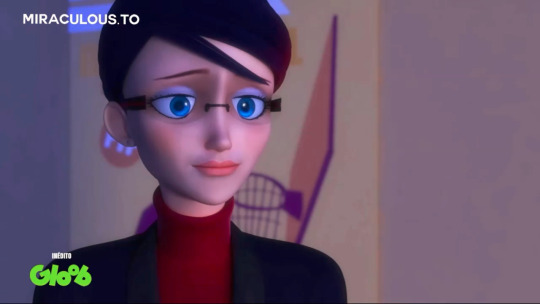
2. Tomoe is evil out of nowhere!!! And with literally no fucking motive as to why???? WHY IS SHE SUPPORTING GABRIEL?????
3. Gabriel go die, bitch looks like a Q-tip and really went “yeah no we don’t need you for modeling anymore let’s just scan and use a clone of you

4. I love how no one in Paris gives a shit for their constant impending doom from a terrorist so much for that support
5. Felix is about to get demonized and god why am I not even surprised anymore! They made a 14 year old a terrorist to justify Marinette’s hatred for her, forget a complex plot
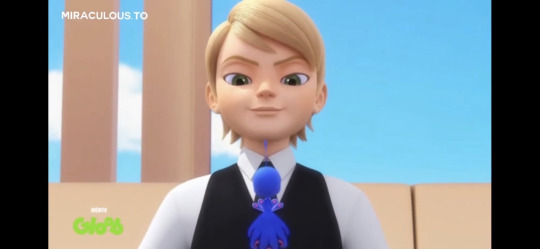
Also the alliance rings are really weird for me, and I have a million questions as to how Gabriel did what he did with the rings and miraculouses which open a million plot holes for discussion, but I’ll make a post about it when the show releases more info on the rings, so I won’t spoil it for anyone who hadn’t seen the spoilers for season 5 yet
#miraculous ladybug#mlb fandom#adrien agreste#chat noir#marinette dupain cheng#ml rants#ml season 5#multiplication#whyyyyyyyy#i will forever not get the appeal of the love square man#it was completely destroyed for me#look at Adrien’s unhealthy obsession to cope and his constant need for approval!#look at all the crimes Marinette committed and the list of awful things she did to get a guy and to remain in power!#I’m tired
24 notes
·
View notes
Note
I know you said not to call Dextixer's threads hate threads on sight...but this one is hate bait shit, no ifs ands or buts, imo. www(.)reddit(.)com/r/RWBY/comments/wff2bv/the_protagonists_had_no_plan_to_save_mantle_and/
Considering his hopepunk thread and his Adam/Ironwood thread, I think it won't be much longer until Dextixer's pulling that. Not because 'RWBY criticism bad' but you can see the same signs of when other RWBY critics started going crazy- talking more personally and sloppier arguments.
"
First things first, i am writing this after i finished rewatching Volume 8, and i will admit that i am quite angry. Rewatching Volume 8 again, if i may be very honest, made me hate the protagonists and their behaviour throughout the volume, and i will most likely make a thread on that, this is just a warning that some things said here might be very much coloured by my current emotions. Regardless, on with the thread"
Case and point.
Dextixer admits that due to his feelings, he may very be acting biased. He could just...not make the thread until he's calmed down so at the very least his tone isn't affected. I say the very least because of the next paragraph.
"Many times in the fandom i have seen team RWBY being praised for "having a plan" to save Mantle while "evil" Ironwood just wanted to sacrifice Mantle for no reason. Many times i have seen praise heaped upon team RWBY, and recently i began to question the narrative. Why exactly are the protagonists of the show to be lauded, when for almost the entire Atlas arc, they had absolutely no plan to save Atlas and only saved it due to a deus ex relic in the last 2 episodes?"
No one has said this. I know this because, given his history, Dextixer's probably thinking of Lilith Fairen when saying this. But as someone who keeps an eye on Lilith and her crazy bullshit- no one in her circle has said this.
They have praised Team RWBY for fighting for Mantle while James doesn't. Or say that James wasn't trying to save Mantle because of 'elitism' but it was never because 'evil'. In fact, they often acknowledge that James had good intentions but just say he was biased and/or that his intentions didn't matter.
This also shows the sloppy argumentation. Notice how he calls the Relic of Creation a 'deus ex machina'? The same relic that was brought up in Volume 7 and is the central focus of James' plan? How that is called a deus ex machina, a term invented to describe a common act in theater where an actor playing an unforeseen God would drop in from above to resolve the conflict for a happy ending? Not only is the Relic too established but it is also a central focus of the antagonist's plan AND doesn't magically solve the conflict, as James is still fighting and Team RWBY fall into the void.
Both the technical definition AND spirit of the term do not apply here. Something that Dextixer at this point should be capable of catching...if he wasn't concerned with his biases first and foremost.
Now I'm not gonna regurgitate his whole post- that's not feasible on laptop, let alone mobile. So all I will do is summarize. I insist that you read the original post.
1. "Ruby is hypocrite because she focus on Amity like Ironwood did!"
Ah yes, because as everyone knows, James' LONG TERM plan of fixing up Amity is the same as Ruby's SHORT TERM plan to use it. It's also not like James' goal couldn't be accomplished if...say...his Mantle suppliers stopped selling to him due to his seemingly blatant disregard for their town. ...Oh...
These are not remotely the same situation. Nobody knows how long James' plan will go on and thus how long the clear issue of Mantle's disenfranchisement will fester. Ruby is also not a fucking civil servant and thus her refusal does not damage her team's ability to cooperate with others due to shit optics.
2. "RUBY PLAN DEATH SENTENCE!"
*Looks behind Dextixer to see James trying to take what he admits is the most technologically nation and fuck off, leaving everyone else to die so he can get in a siege with an immortal*
... Hm.
He tries to fortify this argument by pointing out that the other Kingdoms are not as technologically advanced as Atlas so surely they couldn't bring someone in two days. ... *glances at Argus*
Even then, there is nothing to indicate that Atlas' airships are any faster than the others. And we KNOW they have them, Mistral shows them. He also tries to say that Mistral had their Huntsmen butchered. ... Even though Qrow stated that he knew where to find Huntsmen an episode AFTER and the existence of Dudley and Dee prove this.
I could keep going but the biggest problem is the one I showcased at the beginning, Dextixer's basis- That James' plan was any better. Which given the complete lack of any shown Dust deposits, farm land or even basic materials and construction equipment- To say his plan is even equal to the worst outcome of RWBY'S is far too generous. His plan would be GUARANTEED to kill REMNANT...and his people.
0.000001% chance of victory is still infinitely more than 0%.
3. "Atlas protected by shield!"
... No really.
"hat alone is bad, until one considers that the protagonists preventing Ironwood from accessing the relic literally cause the downfall of Atlas. Salem did not invade Atlas instantly. It was protected by a shield. She waited....
All she had to do is wait....
And our "protagonists" gave her the time to do so."
To this I say-
Hey Dextixer, mind pointing me to James' perpetual motion generator?
... What's that, James has ABSOLUTELY no means of generating infinite power to power those shields? And Salem has literally infinite time so she can just wait him out? And the heroes interfering wouldn't mean jackshit? Not to mention THEY found said river and not James?
"W-well, If Ruby no stop him than Good General could save Atlas!"
What part of 'Infinite' do you not get?
Salem can just sit on ass underneath Atlas until the random number generator of life hits her lucky number and it comes crashing down.
"B-but Ironwood no say he never come ba-"
"Ironwood: We are going to take our plan for Amity Tower and apply it to the city of Atlas.
He crushes the chess piece in his hand, and Ruby jumps to her feet.
Ruby: What?!
Ironwood drops the shattered glass from his hand.
Ironwood: It was Oz's plan in a former life. But he didn't take it far enough.
Yang stands up.
Ironwood: If we harness the power of the Staff, and raise ourselves high into the atmosphere, the city's artificial climate will keep citizens and food supplies unharmed. Always out of reach of whatever Salem may try to send our way."
And if you have any doubts still, here is the plan he was talking about-
"Ironwood: Eh, that's the public story. (walking forward) But with the Staff, we have a constant, seemingly limitless energy source. Oz once speculated it could take us as high as we wanted. To tell you the truth, that served as the inspiration for the Amity Project. Get a communication tower up in the sky, higher than the Grimm can survive so we never lose contact with each other again."
James, by his own words, was planning on never coming down.
Your defense IS the headcanon.
"...Tea-"
So Ruby waiting two days is dumb...but waiting a couple hours while James is hunting for them and they have no known way back down to Atlas is...not dumb?
Hm, seems like 'dumb' just means 'excuse' here.
3. "RELIC NO SAY IT CAN PORTAL, DEUS EX MACHINA!"
Hey Dextixer, since you take your definition from the same exact wikipedia article I did (
Why not list off some examples? ... Oh yeah, the examples given (LOTR'S Great Eagles. LOTF's Naval officer and WOTW's deadly earth virsuses) don't fit with the Relic of Creation due to being too well established.
4. "MANSION! TEA! RUBY NO HERO!"
Nice Handsome Jack quote...
I got a better one.
"Your calculations were always correct. You always killed those on the lighter side of the scale, sacrificing the few for the sake of the many. Even as you left a long trail of bodies. Surely, the lives of those who lived were worth more than those who died."
-The Evils of the World to Kiritsugu Emiya. Fate/Zero, Episode 24.
You try to proclaim that Ruby isn't acting heroic because she's 'holding Atlas hostage' (Ruby isn't holding Penny at Gun point) and 'she's drinking tea' (while ignoring how you'd bitch her put of she tried to). But this is all operating under the idea that James' methods are better,an idea that Fate called bullshit on two years BEFORE RWBY existed.
Even if I bought anything you sold, James is STILL worse.
To use your friend's analogy, James would have pulled a lever killing 10000 to save 10...then the 10 died slower, more painfuls deaths because he didn't realize that there was no way to actually SAVE the people.
"I want to love our protagonists-"
And yet you ignore the obvious and FACTUAL evidence that would let you and instead huffed paint thinner, snorted coke and then blamed them for the hallucinations while backing a man with more hypocrisy and worse plans and methods.
Talk about 'opinions' all you want, actions speak louder. And yours say "I will ignore canon if I don't get what I want!"
18 notes
·
View notes
Text
RWBY V08C14 reaction post
haven’t done something like this for this fandom yet, but the finale was so much all at once that i could not muster any level of critical thinking the first go-around. my thoughts have...settled somewhat with a second rewatch. still nothing conclusive (obviously), but at least coherent enough to be written down.
in rough chronological order:
i am very into it, of course, but i’m still not quite sure what to make of the fact that this finale very explicitly pivots around Winter Schnee, to the extent that the episode (sans prologue and coda) are bookended by her. she begins the episode charging into a fight, and ends it the same way. even putting aside that her in-universe presence has increased by magnitudes, that we end a season where she has mostly been a sparse supporting player with THIS has implications i can’t suss out for her narrative role going forward.
going into the finale i thought that Ironwood vs. Winter would turn out to be another RWBY Flagship Fight (ie long and flashy and indulgent in the best ways), but i pretty much knew that wouldn’t be the case once the fight began in earnest and they immediately started talking to each other.
for what we did get i’m happy to say that the Core Dynamic of the fight was exactly what i predicted: Winter rushing in to melee and not giving Ironwood enough time to fire, Ironwood trying to make room by shoving her away and using his cannon as a makeshift club--even down to breaking the cannon formation BACK to dual wielding to give himself an edge.
i will say that for Winter to have blocked him head-on--this is James Ironwood, who once stopped an Alpha Beowolf cold with one bionic hand, and now he’s got TWO--with her broken noodle arms is...incredibly cool. stupid! but cool.
Ironwood doing the double pistol whip while screaming about how no one is grateful has i wouldn’t have to be doing this if you just behaved all over it.
in retrospect i’m not sure why i expected a RWBY Flagship Fight when just about every fight this season has been extremely different. the camera work is always fucking frantic, we’re often cross-cutting between different simultaneous fights, and there are far fewer shots where both combatants are clearly shown and evenly matched. about the only fight we’ve had resembling that is AceOps vs Penny waaaaaaay back in Strings--even the low-stakes triumphant JNPER + Winter vs. Ironwood fight in Creation was extremely short and crosscut with BRA vs. AceOps.
case in point: the showdown in Grand Central takes up pretty much the entire episode, but combatants are continuously entering and exiting, the setting’s physical dimensions feel wonky and surreal, and the fact that half of the people fighting have flight capabilities means we’re relying on wide shots and oners to figure out what the fuck is going on. it’s a war now, and even though we follow only a handful of characters in it the fights carry that grander and more desperate tone.
Cinder relies twice this episode on just fucking nova-ing herself to overwhelm her Maiden opponents. it’s different from how she usually fights, which is still fireballs and conjured swords/projectiles--she’s learning to use her Maiden powers to wreak havoc on a larger scale, which a) reinforces what we already know of Cinder, but b) complements her recent relearning of subtlety and manipulation. still a tenuous balance of extremes that can and will shatter, though.
Weiss got to save everyone during the fight, and none of it mattered in the end.
the thing about priority one is that they all planned for this. they all went in planning for the contingency where they don’t make it out, where they have to watch others not make it out.
Weiss plucking Penny out of the air and Penny pleading to make the sacrifice play is an EXACT recreation of what happened in Enemy of Trust, down to the saved looking up at the savior while the savior is looking onward. she’s just swapped places with the Schnee in question, and...they are the priority targets this time, unfortunately.
Cinder smugly flipping her hair out of...her eyepatch...she really is living her best life and she knows it
Blake made the right choice, and it didn’t matter at all.
Qrow ending the last episode with a berserker charge at Harriet and then immediately pulling back here and trying to talk her down really got to me, as did him trying to block the bomb with his body. the man is so desperately trying to be better than he was, and it doesn’t take a lot anymore for him to realize the right path.
Elm and Vine--
the thing about Elm and Vine is that both their powers boil down to getting attached. so watching Elm hold Vine in place while Vine holds the two airships together, everyone in this little world, it’s...everything i could ever want, out of how the story of the AceOps would end.
Anairis Quinones for dark horse MVP. why can’t you just let me do my job, delivered in the way that it was, is the perfect encapsulation of Harriet Bree desperately trying to outrun her personal feelings and the grief it has given her.
Elm tells Harriet that she’s their friend, to stop her from killing a part of herself as she tries to kill others. it’s the first time this happens in the episode, but not the only time.
Penny saved Blake so they could save Ruby together, and it didn’t matter at all.
our heroes have GOT to stop falling for the “watch the thing flying in the air! OH WAIT I STILL HAVE A WEAPON IN MY HAND WALLOP WALLOP” trick. it happens multiple times in this one episode.
Harriet, who has the fastest Speed Semblance known, says there’s no time to make it out of the blast range. she doesn’t try to outrun it. she just...stays put, and admits that she brought them all here, to this. i’m sorry.
here’s the thing: they’re soldiers. they were prepared for this eventuality, where they don’t make it out. that’s why Elm let Vine go grab Harriet; because she thought they were all going to die, and if that happened she wanted Harriet close enough to reach.
but--just like with Team Hero--some of them do make it out. they just have to watch.
Vine and Hazel sacrificed themselves in the same way in the end: pulling their loved ones close wasn’t working, so they threw themselves around the thing trying to kill them instead.
Ruby was clever, and pragmatic, and brave. it didn’t matter in the end.
Cinder letting Neo fall as soon as she gets a chance proves that she still lacks patience, and that’s going to bite her in the ass.
the Penny-Blake fastball special and the fall; Penny crying tears for the first time, but not moving immediately to rage, as she had last episode, when Yang fell.
Weiss’ shaking hands around Gambol Shroud, crying berserker tears as she tries, desperately, to pull off another miracle. it’s another role reversal in a way: her sister’s the Riza Hawkeye, but she’s the one emptying useless clip after useless clip into an enemy she can’t kill, because her heart has been ripped in two.
the last time Nora Valkyrie saw Jaune Arc, they clasped hands, and their eyes met with determination, and hope.
it figures that a Schnee would be the last one standing, letting all her friends die first. she was right, but again: wrong Schnee.
Weiss diving past Cinder’s blind spot to slice the Grimm Arm, to save Penny--the same script, but the wrong player. and too late.
at Haven, Jaune went from trying to do harm to unlocking his Semblance, and realizing that he was meant to heal. here, he goes from trying to do what he is meant to do, what he has made peace with, to...
it will take a long time, i think, for him to learn to live with himself, even with Penny reassuring him that this is what she wants. to go from wanting to harm to being the one who does no harm, to being forced to acknowledge a person’s right to die, and carry out the deed himself. it’s a new variation on what he’s always had to wrestle with since Pyrrha’s sacrifice.
Weiss managed to outlast Cinder Fall without an Aura WITHOUT getting her entire body broken, Winter
the boundary between material worlds is made of darkness. the boundary between souls is made of light, and there is no danger of falling.
where...what is this? of course Winter doesn’t know. she never would have, even if she had gotten the powers, because she would have used the Transfer machine.
i thought of you, and here we are. that was all it took. the last time Penny saw Winter, Winter was still loyal to Ironwood. she’s only known abstractly, secondhand from Weiss, that Winter was on their side again and trying to help save Mantle, for about an hour. and yet: i thought of you.
and in the face of this thought that is love, Winter averts her eyes. tries in vain to hide her face, because she knows she is unworthy. she doesn’t deserve this.
but here’s the thing: no one deserves this. Penny. are you...the one? even Penny herself wasn’t sure.
you were my friend. the second time it happens this episode. friends save friends from themselves. friends transform what would have been murder into sacrifice.
remember what Penny said to Cinder, shortly before Cinder killed her? you wouldn’t know anything about friends. she’s right. it wasn’t Cinder’s choice, but she’s right. and now Cinder has learned how to use that.
i’ll be part of you. it is, of course, something that’s been brought up repeatedly this whole season. but it’s also what Winter said to Penny after Fria died: she’s a part of you now.
and i do love this yoking together of arc words. Winter is of course the firstborn Schnee, but Winter is, more broadly, The Firstborn in this new generation. so here we have something similar to the chain that begins with Winter letting her sisters go, through Penny letting Emerald go, through Emerald helping Oscar escape, to Atlas’ however ephemeral victory over Salem. what Winter begins--haltingly and with resentment--becomes transformed into radiant grace in the hands of her younger siblings. and she gets to be the direct benefactor this time. the prodigal daughter returns to her family.
during Enemy of Trust we watched from the outside as Oscar fell and Penny rose, as one set of eyes closed as another opened. during The Final Word, we watch from the inside: one set of eyes close. another opens.
Winter’s leitmotif plays on the piano for the first time since the previous season as she comes back to the world. it makes sense. the piano version is for her sisters, and she just left one of them.
here is the apotheosis of Winter Schnee: she gets back up. she falters and sways but she gets back up, and then she, the person who once managed to convince herself that so long as she could make peace with someone else’s choice it meant she too was choosing, tells the man who has been choosing for her for years: you chose nothing. and she rises.
in the end James Ironwood was finished by his petard thrice over. Atlas had defected against him. his greatest creation had become the Maiden and unshackled herself from him. and there is of course, the cannon: a literal petard, in the other words, which he fires at Winter, and Winter reflects back upon him.
Jaune Arc used the heirloom that his family has held for generations to kill a defenseless girl. he took the blade and sunk it in deep, because Penny trusted him and he had to be sure.
and then it shattered in his hands.
there’s something here in the second fight between Maidens, about Cinder having a named weapon and forsaking it for what she can make on the fly, and Winter insistent on using a weapon with no name at all, but i still can’t put my finger on it.
Winter never got to see Weiss try to Summon her Nevermore.
the thing that gets me about how it turns out is: Winter was winning. she’d managed to get her hands on the Staff, and even with Cinder’s immediate counterattack she managed to get the Staff away from Cinder. but then Cinder saw Jaune and Weiss, and she remembered a few days ago, when Penny saved Winter instead of going after Cinder, when Winter attacked Cinder to save Penny.
so Cinder attacks Weiss and Jaune instead of racing for the Staff. and Winter--
this is Winter Schnee. she saves people despite herself. she runs toward them, despite herself. and it has always, always been what saves her.
not anymore.
last time it had been Winter who was in mortal danger, and Weiss who, with Ruby’s help, drove Cinder off. same script, wrong player. and too late.
Weiss falls and for a moment, the camera makes it seem like Winter is falling too.
she wants to. no one deserves this.
the thing you have to ask when characters leap for the exit and fall just short is: is it about faith, or friendship? in Jaune’s case it’s both. his faith broke with Crocea Mors. and the portal is one-way, so he had no friends to grab him from the other side.
but Nora was still trying. they clasped hands. she promised.
the first time Winter sees her family--really sees them, after years of separation--she averts her eyes. she hides her face from them, because how can she tell them that Weiss is gone? how can she tell Penny’s friends that Penny is a part of her now, when Penny is just a part, now?
there are people all around her looking to her. there are voices within her. she has never been more alone.
(Winter Schnee has never met Pyrrha Nikos, and Pyrrha Nikos never became Maiden. because Pyrrha Nikos never became Maiden. Cinder Fall did that, too.)
this is what Winter Schnee thinks, as she screams and charges, as she kills Grimm faster than they are drawn in by her despair: in the fairy tales, eldest siblings never win.
i failed you again, master. master, but not queen.
Cinder won this. the heroes tried and tried and tried and none of it mattered, and she won this. but here’s the thing: Cinder won because she was LUCKY, and because she made her own luck. that she was able to pin things on Neo and Team Hero depended on things going exactly as planned, and some things going better than planned. and the reason she’d even made it that far was because she cheated, with the last use of a divine relic. it doesn’t take away her from her victory, but what i do know is this: this is her finest moment. she will never win as completely ever again, and she will fall farther than she has ever feared. (and that will save her, in the end.)
and that’s checkmate. i said that i wanted Atlas to fall the same way that Amity rose, but of course they did it like this. of course it would horrific yet unspectacular, with its General slumped in defeat, unable to fire a single shot from his gun. with the city in the sky falling onto Mantle, in Mantle’s palette. from the Dust from which it arose into Dust again.
as below, so above.
252 notes
·
View notes
Note
Hi :) If it's not too much trouble, could you please share your take on why they'd continue the Adventure brand after tri. was such a flop? (and a tangent: what does "dark history" even mean?). We got Kizuna, the reboot, and a 02 movie. Logically, it doesn't really make sense they'd keep investing in it.
This is a thorny topic, and I'd like to reiterate that although I've ended up making more posts related to this series and the discourse surrounding it recently (probably because it's even more on the mind now that another movie is on the horizon and a lot of people are apprehensive for various reasons), I do not want this blog to be making a brand out of being critical of this series. I’m writing this here and in public because I figured that there is a certain degree I need to clarify what I mean about audience reception/climate and how it might impact current or future works, and I’m admittedly also more than a little upset that I occasionally see Western fanbase criticisms of the series getting dismissed by people claiming that the only people mad about it are dramamongering or ignorant Westerners (which could not be further from the truth). However, this is mainly to address this and to answer your question, and is not intended to try and change anyone's existing opinion or impression of the series as much as it's me trying to explain (from my own personal reading of the situation) what practically went down with critical reception in real life; no more, no less.
The short summary of the matter is:
The series was a moderate financial success (albeit with some caveats; see the long version for details) and definitely outstripped a lot of prior attempts to revive the franchise;
However, the overall Japanese fanbase-side critical backlash from tri. was extremely and viciously negative to the point where even acknowledging the series too much could easily result in controversy;
Kizuna’s production and the PR surrounding it very obviously have this in mind with a lot of apparent “damage control” elements.
The long version is below.
Note that while I try to be diligent about citing my sources so people understand that I’m not just making things up wholesale, I’m deliberately refraining from linking certain things here this time, both because some of the things mentioned have some pretty crude things written there -- it’s not something I feel comfortable directing people to regardless of what language it’s in -- and because I don’t want to recklessly link things on social media and cause anyone to go after or harass the people involved. For the links that have been provided, please still be warned that some of them don’t really link to particularly pleasant things.
I am not writing the following information to suggest that anyone should agree or disagree with the sentiments being described. I know people tend to take "a lot of people like/hate this" as a signal of implication "it is correct to like/hate this" when it's not (and I especially dislike the idea of implying that Japanese fanbase opinions are the only correct ones). There's a reason I focus on "critical reception being this way" (because it influences marketing decisions and future direction) rather than how much this should impact one's personal feelings; this is coming from myself as someone who is shamelessly proud of liking many things that had bad critical reception, were financial failures, or are disliked by many. As I point out near the end, the situation also does seem to be changing for the better in more recent years as well.
Also, to be clear, I'm a single person who's observing everything best I can from my end, I have no affiliations with staff nor do I claim to, and as much as I'm capable of reading Japanese and thus reading a lot of people's impressions, I'm ultimately still another “outsider” looking in. These are my impressions from my observation of fan communal spaces, following artists and reading comments on social media and art posting websites, and results from social media searches. In the end, I know as much as anyone else about what happened, so this is just my two cents based on all of my personal observations.
A fanbase is a fanbase regardless of what part of the world you're from. There are people who love it and are shameless about saying so. There are people who have mixed feelings or at least aren't on extreme ends of the spectrum (as always, the loudest ones are always the most visible, but it's not always easy to claim they're the predominant percentage of the fanbase). That happens everywhere, and I still find that on every end I've seen. However, if I'm talking about my impressions and everything I’ve encountered, I will say that the overall Japanese reaction to tri. comes off as significantly more violently negative on average than the Western one, which is unusual because often it's the other way around. (I personally feel less so because the opinions are that fundamentally different and more so because we're honestly kind of loud and in-your-face people; otherwise, humans are mostly the same everywhere, and more often than not people feel roughly the same about everything if they’re given the same information to work with.)
This is not something I can say lightly, and thus would not say if I didn’t really get this impression, but...we're talking "casually looking up movie reviews for Kizuna have an overwhelming amount of people casually citing any acknowledgment of tri. elements as a negative element", or the fact that even communal wikis for "general" fandoms like Pixiv and Aniwota don't tend to hold back in being vicious about it (as of this writing, Pixiv's wiki refuses to consider it in the same timeline as Adventure, accusing it of being "a series that claims to be a sequel set three years after 02 but is in fact something different"). Again, there are people who openly enjoy it and actively advocate for it (and Pixiv even warns people to not lord over others about it condescendingly because of the fact that such people do exist), and this is also more of a reflection of “the hardcore fanbase on the Internet” and not necessarily the mainstream (after all, there are quite a few other Digimon works where the critical reception varies very heavily between the two). Nevertheless, the take-home is that the reputation is overall negative among the Internet fanbase to the point that this is the kind of sentiment you run into without trying all that hard.
I think, generally speaking, if we're just talking about why a lot of people resent the series, the reasons aren't that different from those on the Western side. However, that issue of "dark history" (黒歴史): there's a certain degree of demand from the more violently negative side of the fanbase that's, in a sense, asking official to treat it as a disgrace and never acknowledge it ever again, hence why Kizuna doing so much as borrowing things from it rather than rejecting it outright is still sometimes treated like it’s committing a sin. So it's somewhat close in spirit to a retcon movement, which is unusual because no other Digimon series gets this (not even 02; that was definitely a thing on the Western end, but while I'm sure there are people who hate it that much on their end too, I've never really seen it gain enough momentum for anyone to take it seriously). If anyone ever tells you that Japanese fanbases are nice to everything, either they don't know Japanese, are being willfully ignorant, or are lying to you, because there is such thing as drama in those areas, and in my experience, I've seen things get really nasty when things are sufficiently pushed over the edge, and if a fanbase wants to have drama, it will have drama. This happens to be one of those times.
(If you think this is extreme, please know that I also think so too, so I hope you really understand that me describing this sentiment does not mean I am personally endorsing it. Also, let me reiterate that the loudest section of the fanbase is not necessarily the predominant one; after all, as someone who’s been watching reactions to 02 over the years, I myself can attest that its hatedom has historically made it sound more despised than it actually is in practice.)
My impression is that the primary core sentiment behind why the series so much as existing and being validated is considered such an offense (rather than, say, just saying "wow, that writing was bad" and moving on) is heavily tied to the release circumstances the series came out in during 2015-2018, and the idea that "this series disrespected Adventure, and also disrespected the fanbase.” (I mean, really, regardless of what part of the world you’re from, sequels and adaptations tend to be held to a higher bar of expectation than standalone works, because they’re expected to do them justice.) A list of complaints I’ve come across a lot while reading through the above:
The Japanese fanbase is pretty good at recordkeeping when it comes to Adventure universe lore, partially because they got a lot of extra materials that weren’t localized, but also partially because adherence to it seems to generally be more Serious Business to them than it is elsewhere. For instance, “according to Adventure episode 45, ‘the one who wishes for stability’ (Homeostasis) only started choosing children in 1995, and therefore there can be no Chosen Children before 1995” is taken with such gravity that this, not anything to do with evolutions or timeline issues, is the main reason Hurricane Touchdown’s canonicity was disputed in that arena (because Wallace implies that he met his partners before 1995). It’s a huge reason the question of Kizuna also potentially not complying to lore came to the forefront, because tri. so flagrantly contradicts it so much that this issue became very high on the evaluation checklist. In practice, Kizuna actually goes against Adventure/02 very little, so the reason tri. in particular comes under fire for this is that it does it so blatantly there were theories as early as Part 1 that this series must take place in a parallel universe or something, and as soon as it became clear it didn’t, the resulting sentiment was “wow, you seriously thought nobody would notice?” (thus “disrespecting the audience”).
A lot of the characterization incongruity is extremely obvious when you’re following only the Japanese version, partially because it didn’t have certain localization-induced characterization changes (you are significantly less likely to notice a disparity with Mimi if you’re working off the American English dub where they actually did make her likely to step on others’ toes and be condescending, whereas in Japanese the disparity is jarring and hard to miss) and partially due to some things lost in translation (Mimi improperly using rough language on elders is much easier to spot as incongruity if you’re familiar with the language). Because it’s so difficult to miss, and honestly feels like a lot of strange writing decisions you’d make only if you really had no concept of what on earth happened in the original series, it only contributes to the idea that they were handling Adventure carelessly and disrespectfully without paying attention to what the series was even about (that, or worse, they didn’t care).
02 is generally well-liked there! It’s controversial no matter where you go, but as I said earlier, there was no way a retcon movement would have ever been taken seriously, and the predominant sentiment is that, even if you’re not a huge fan of it, its place in canon (even the epilogue) should be respected. So not only flagrantly going against 02-introduced lore but also doing that to a certain quartet is seen as malicious, and you don’t have as much of the converse discourse celebrating murdering the 02 quartet (yeah, that’s a thing that happened here) or accusing people with complaints of “just being salty because they like 02″ as nearly as much of a factor; I did see it happen, or at least dismissals akin to “well it’s Adventure targeted anyway,” but they were much less frequent. The issue with the 02 quartet is usually the first major one brought up, and there’s a lot of complaints even among those who don’t care for 02 as much that the way they went about it was inhumane and hypocritical, especially when killing Imperialdramon is fine but killing Meicoomon is a sin. Also, again, “you seriously think nobody will see a problem with how this doesn’t make sense?”
I think even those who are fans of the series generally agree with this, but part of the reason the actual real-life time this series went on is an important factor is that the PR campaign for this series was godawful. Nine months of clicking on an egg on a website pretending like audience participation meant something when in actuality it was blatantly obvious it was just a smokescreen to reveal info whenever they were ready? This resulted in a chain effect where even more innocuous/defensible things were viewed in a suspicious or negative light (for instance, "the scam of selling the fake Kaiser's goggles knowing Ken fans would buy it only to reveal that it's not him anyway"), and a bunch of progressively out-of-touch-with-the-fanbase statements and poor choices led to more sentiment “yeah, you’re just insulting the fanbase at this point,” and a general erosion of trust in official overall.
On top of that, the choice of release format to have it spread out as six movies over three years seems to have exacerbated the backlash to get much worse than it would have been otherwise, especially since one of the major grievances with the series is that how it basically strung people along, building up more and more unanswered questions before it became apparent it was never going to answer them anyway. So when you’re getting that frustrated feeling over three whole years, it feels like three years of prolonged torture, and it becomes much harder to forgive for the fallout than if you’d just marathoned the entire thing at once.
For those who are really into the Digimon (i.e. species) lore and null canon, while I’m not particularly well-versed in that side of the fanbase, it seems tri. fell afoul of them too for having inaccurately portrayed (at one point, mislabeled) special attacks and poorly done battle choreography, along with the treatment of Digimon in general (infantilized Digimon characterization, general lack of Digimon characters in general, very flippant treatment of the Digital World in Parts 3-5). If you say you’re going to “reboot” the Digital World and not address the entire can of worms that comes with basically damaging an entire civilization of Digimon, as you can imagine, a lot of people who actually really care about that are going to be pissed, and the emerging sentiment is “you’re billing this as a Digimon work, but you don’t even care about the monsters that make up this franchise.”
The director does not have a very positive reputation among those who know his work (beyond just Digimon), and in general there was a lot of suspicion around the fact they decided to get a guy whose career has primarily been built on harem and fanservice anime to direct a sequel to a children’s series. Add to that a ton of increasingly unnerving statements about how he intended to make the series “mature” in comparison to its predecessor (basically, an implication that Adventure and 02 were happy happy joy series where nothing bad ever happened) and descriptions of Adventure that implied a very, very poor grasp of anything that happened in it: inaccurate descriptions of their characters, poor awareness of 02′s place in the narrative, outright saying in Febri that he saw the Digimon as like perpetual kindergartners even after evolving, and generally such a flippant attitude that it drove home the idea that the director of an Adventure sequel had no respect for Adventure, made this series just to maliciously dunk on it for supposedly being immature, and has such a poor grasp of what it even was that it’s possible he may not have seen it in the first place (or if he did, clearly skimmed it to the extent he understood it poorly to pretty disturbing levels). As of this writing, Aniwota Wiki directly cites him as a major reason for the backlash.
In general, consensus seems to be that the most positively received aspect of the series (story-wise) was Part 3 (mostly its ending, but some are more amenable to the Takeru and Patamon drama), and the worst vitriol goes towards Parts 2 (for the blatantly contradictory portrayal of Mimi and Jou and the hypocritical killing of Imperialdramon) and 4 (basically the “point of no return” where even more optimistic people started getting really turned off). This is also what I suspect is behind the numbers on the infamous DigiPoll (although the percentage difference is admittedly low enough to fall within margin of error). However, there was suspicion about the series even from Part 1, with one prominent fanartist openly stating that it felt more like meeting a ton of new people than it did reuniting with anyone they knew.
So with all of that on the table: how did this affect official? The thing is that when I say “violently negative”, I mean that also entailed spamming official with said violently negative social media comments. While this is speculation, I am fairly certain that official must have realized how bad this was getting as early as between Parts 4 and 5, because that’s where a lot of really suspicious things started happening behind the scenes; while I imagine the anime series itself was now too far in to really do anything about it, one of the most visible producers suddenly vanished from the producer lineup and was replaced by Kinoshita Yousuke, who ended up being the only member of tri. staff shared with Kizuna (and, in general, the fact that not a single member of staff otherwise was retained kind of says a lot). Once the series ended in 2018 and the franchise slowly moved into Kizuna-related things, you might notice that tri.-branded merch production almost entirely screeched to a halt and official has been very touchy about acknowledging it too deeply; it’s not that they don’t, but it’s kind of an awfully low amount for what you’d think would be warranted for a series that’s supposed to be a full entry in the big-name Adventure brand.
The reason is, simply, that if they do acknowledge it too much, people will get pissed at them. That’s presumably why the tri. stage play (made during that interim period between Parts 4 and 5 and even branded with the title itself) and Kizuna are really hesitant to be too aggressive about tri. references; it’s not necessarily that official wants to blot it out of history like the most extreme opinions would like them to, but even being too enthusiastic about affirming it will also get them backlash, especially if the things they affirm are contradictory to Adventure or 02. And considering even the small references they did put in still got them criticism for “affirming” tri. too much, you can easily see that the backlash would have been much harder if they’d attempted more than that; staying as close as possible to Adventure and 02 and trying to deal with tri. elements only when they’re comparatively inoffensive was pretty much the “safe” thing to do in this scenario (especially since fully denying tri. would most certainly upset the people who did like the series, and if you have to ask me, I personally think this would have been a pretty crude thing to have done right after the series had just finished). Even interviews taken after the fact often involve quickly disclaiming involvement with the series, or, if they have to bring up something about it, discussing the less controversial aspects like the art (while the character designs were still controversial, it’s at least at the point where some fanartists will still be willing to make use of them even if they dislike the series, albeit often with prominent disclaimers) or the more well-received parts of Part 3; Kizuna was very conspicuously marketed as a standalone movie, even if it shared the point of “the Adventure kids, but older” that tri. had.
(Incidentally, the tri. stage play has generally been met with a good reputation and was received well even among people who were upset with the anime, so it was well-understood that they had no relation. In fact, said stage play is probably even better received than Kizuna, although that’s not too surprising given the controversial territory Kizuna goes into, making the stage play feel very play-it-safe in comparison.)
So, if we’re going to talk about Kizuna in particular: tri. was, to some degree, a moderate financial success, in the sense that it made quite a bit of money and did a lot to raise awareness of the Digimon brand still continuing...however, if you actually look at the sales figures for tri., they go down every movie; part of it was probably because of the progressively higher “hurdle” to get into a series midway, but consider that Gundam Unicorn (a movie series which tri.’s format was often compared to) had its sales go up per movie thanks to word of mouth and hype. So while tri. does seem to have gotten enough money to help sustain the franchise at first, the trade-off was an extremely livid fanbase that had shattered faith in the brand and in official, and so while continuing the Adventure brand might still be profitable, there was no way they were going to get away with continuing to do this lest everything eventually crash and burn.
Hence, if you look at the way Kizuna was produced and advertised, you can see a lot of it is blatantly geared at addressing a lot of the woes aimed at tri.: instead of the staff that had virtually no affiliation with Toei, the main members of staff announced were either from the original series (Seki and Yamatoya) or openly childhood fans, the 02 quartet was made into a huge advertising point as a dramatic DigiFes reveal (and character profies that tie into the 02 epilogue careers prominently part of the advertising from day one), and they even seemed to acknowledge the burnout on the original Adventure group by advertising it so heavily as “the last adventure of Taichi and his friends”, so you can see that there’s a huge sentiment of “damage control” with it. How successful that was...is debatable, since opinions have been all over the board; quite a few people were naturally so livid at what happened with tri. that Kizuna was just opening more of the wound, but there were also people who liked it much better and were willing to acknowledge it (with varying levels of enthusiasm, some simply saying “it was thankfully okay,” and some outright loving it), and there was a general sentiment even among those who disliked both that they at least understood what Kizuna was going for and that it didn’t feel as inherently disrespectful. (Of course, there are people who loved tri. and hated Kizuna, and there are people who loved both, too.)
Moreover, Kizuna actually has a slightly different target audience from tri.; there’s a pretty big difference between an OVA and a theatrical movie, and, quite simply, Kizuna was made under the assumption that a lot of people watching it may not have even seen tri. in the first place. An average of 11% of the country watched Adventure and 02, but the number of people who watched tri. is much smaller, in part due to the fact that its “theater” screenings were only very limited screenings compared to Kizuna being shown in theaters in Japan and worldwide, and in part due to the fact that watching six parts over three years is a pretty huge commitment for someone who may barely remember Digimon as anything beyond a show they watched as a kid, and may be liable to just fall off partway through because they simply just forgot. (Which also probably wasn’t helped by the infamously negative reputation, something that definitely wouldn’t encourage someone already on the fence.) And that’s yet another reason Kizuna couldn’t make too many concrete tri. references; being a theatrical movie, it needs to have as wide appeal as possible, and couldn’t risk locking out an audience that had a very high likelihood of not having seen it, much less to the end -- it may have somewhat been informed by tri.’s moderate financial success and precedent, but it ultimately was made for the original Adventure and 02 audience more than anything else.
I would say that, generally, while Kizuna is “controversial” for sure, reception towards the movie seems to be more positive than negative, it won over a large chunk of people who were burned out by tri., and it clearly seems to have been received well enough that it’s still being cashed in on a year after its release. The sheer existence of the upcoming 02-based movie is also probably a sign of Kizuna’s financial and critical success; Kinoshita confirmed at DigiFes 2020 that nothing was in production at the time, and stated shortly after the movie’s announcement that work on it had just started. So the decision to make it seems to have been made after eyeing Kizuna’s reception, and, moreover, the movie was initially advertised from the get-go with Kizuna’s director and writer (Taguchi and Yamatoya), meaning those two have curried enough goodwill from the fanbase that this can be used to promote the movie. (If not, you would think that having and advertising Seki would be the bigger priority.) While this is my own sentiment, I am personally doubtful official would have even considered 02 something remotely profitable enough on its own to cash in on if it weren’t for this entire sequence of events of 02′s snubbing in tri. revealing how much of a fanbase it had (especially with the sheer degree of “suspicious overcompensation” Kizuna had with its copious use of the 02 quartet and it tagging a remix of the first 02 ED on the Hanareteitemo single, followed by the drama CD and character songs), followed by Kizuna having success in advertising with them so heavily. Given all of the events between 2015 and now, it’s a bit ironic to see that 02 has now become basically the last resort to be able to continue anything in the original Adventure universe without getting too many people upset at them about it.
The bright side coming out of all of this is that, while it’s still a bit early to tell, now that we’re three years out from tri. finishing up and with Kizuna in the game, it seems there’s a possibility for things improving around tri.’s reception as well. Since a lot of the worst heated points of backlash against it have a very “you had to have been there” element (related to the PR, release schedule, and staff comments), those coming in “late” don’t have as much reason to be as pissed at it; I’ve seen at least one case of a fanartist getting back into the franchise because of Kizuna hype, watching tri. to catch up, casually criticizing it on Twitter, and moving on with their life, presumably because marathoning the whole thing being generally aware of what’ll happen in it and knowing Kizuna is coming after anyway gives you a lot less reason to be angry to the point of holding an outright grudge. Basically, even if you don’t like it, it’s much easier to actually go “yeah, didn’t like that,” not worry too much about it, and move on. Likewise, I personally get the impression that official has been starting to get a little more confident about digging up elements related to it. Unfortunately, a fairly recent tweet promoting the series getting put on streaming services still got quite a few angry comments implying that they should be deleting the scourge from the Internet instead, so there’s still a long way to go, but hopefully the following years will see things improve further...
In regards to the reboot, I -- and I think a lot of people will agree with me -- have a bit of a hard time reading what exact audience it’s trying to appeal to; we have a few hints from official that they want parents to watch it with their children, and that it may have been a necessary ploy in order to secure their original timeslot. So basically, the Adventure branding gets parents who grew up with the original series to be interested in it and to show it to their kids, and convinces Fuji TV that it might be profitable. But as most people have figured by now, the series has a completely different philosophy and writing style -- I mean, the interview itself functionally admits it’s here to be more action-oriented and to have its own identity -- and the target audience is more the kids than anything else. As for the Internet fanbase of veterans, most people have been critical of its character writing and pacing, but other than a few stragglers who are still really pissed, it hasn’t attracted all that much vitriol, probably because in the end it’s an alternate universe, it doesn’t have any obligation to adhere to anything from the original even if it uses the branding, and it’s clearly still doing its job of being a kids’ show for kids who never saw the original series nor 02, so an attempt to call it “disrespectful” to the original doesn’t have much to stand on. A good number of people who are bored of it decided it wasn’t interesting to them and dropped it without incident, while other people are generally just enjoying it for being fun, and the huge amount of Digimon franchise fanservice with underrepresented Digimon and high fidelity to null canon lore is really pleasing the side of the fanbase that’s into that (I mean, Digimon World Golemon is really deep in), so at the very least, there’s not a lot to be super-upset about.
56 notes
·
View notes
Text
why blippi is rotting yr children's brains
preface: i literally expect no one to read this. it is an essay length, strong opinion piece critiquing a niche youtube-based children's show that i don't expect most of y'all to even have knowledge of lol. but like, i promise that even if you know nothing about what i'm talking about, in my incredibly, super humble opinion, it's a good piece of writing and interesting nonetheless. anyway if you read this whole thing for some reason yr really hot and we should kiss.
i thoroughly vet everything my child watches before he watches it, episode by episode. and we rarely watch youtube for entertainment; we usually just look up educational videos when he has a question about something and wants more detail than i can provide him. and that's mainly because children's content on youtube is so fucking troubling and distressing. i don't judge parents who give their children a tablet at a restaurant at all bc i've been there and sometimes it's easier on everyone to just put on a video and avoid a giant scene, but i do judge parents who just leave their children alone with youtube kids on autoplay.
take stevin john, a literal millionaire who got famous from dressing up as a silly character called blippi and going on tours of places like aquariums, zoos, construction sites, etc and posting it on youtube. this has branched into a whole empire of blippi videos, hulu shows and specials, live shows and tours (that he outsources to another character actor), merchandise and so on. this 30-something year old man cites his main influence as being mr. rogers, but i question if he's ever even seen an episode of that program.
mr. rogers had no background in early childhood development or media production, but he revolutionized the world of children's media, because he respected his audience and didn't shy away from real world situations, all while creating a show with an enormous heart. mr. rogers begins his episodes by inviting the viewer in, literally changing his attire to be more comfortable, and talking about/doing things he genuinely cares about. whereas mr. rogers calmly and maturely addresses the viewer, blippi puts on a high pitched, contrived voice, interjecting every other sentence with a forced exclamation such as, "teehee! we're having so much fun!"
i don't find it a coincidence that john (blippi) is a veteran, either. his videos are completely devoid of the absurd, abstract, childlike thinking that makes children's media fun, creative, and entertaining. his thinking and process is methodical, devoid of emotion, and very superficial. this line of thinking clearly shows the kind of creative sterilization and emphasis on sameness and conformity instilled in the military. blippi simply observes things and interacts with them in a stale, matter-of-fact way. "this ball is purple! this ball is pink! anyway... what's over there? teehee! a car! vroom, vroom!" objects are colors, toy cars don't do anything but drive, curiosity is simply not encouraged.
he uses the "it's educational!" excuse to hide the fact that his show lacks everything that makes media a valuable resource for children to consume in the first place. further than identifying colors, numbers, and the occasional letter or shape, there is just this total lack of children's need for social and emotional development. when mr. rogers breaks the fourth wall to address the viewer and let them know they're special, it feels authentic and natural, because we've spent the last half hour building whole worlds with diverse characters and unique stories in a pretend neighborhood, learning about and enjoying different musical instruments, being exposed to and making friends with (even if parasocially, it is still a real bond to children when done properly) children who are similar to us in character regardless of physical or environmental differences, feeding the fish, making art together, and so on. when blippi tells the viewer, "you are very special, and i enjoy spending time with you!" it falls completely flat and feels unearned, because the last half hour was spent running around a soft play center pointing at bright, colorful objects, visiting interesting locations like farms or fruit production factories while failing to acknowledge the humanity of the humans actually working there (everything is machine or product focused; the human workers are simply an extension of the machine), learning "fun facts" about elephants that just list attributes of elephants, not taking the opportunity to inform the viewers of elephants' intelligence, or diet, or matriarchal society. it is a loud, sensory overwhelming display of a man so disconnected from the social and emotional needs and desires of children that he assumes they're stupid, easily entertained idiots who only need some silly dances and fast-moving cartoon graphics to give their attention (meaning time and desire to purchase products meaning $$$). john clearly views his audience as a means to gaming the algorithm and ultimately a paycheck by the hollow way he addresses them.
the show is so narcissistic, so focused on all the fun blippi is supposedly having, but he lacks any of the character traits that make individual children's show hosts memorable, so much so that he was able to have someone else who doesn't even vaguely resemble him dress as blippi and impersonate him and host the show or appear at live shows, and it went unnoticed by most of his toddler and child audience. the show is so formulaic and the character of blippi is so unmemorable that instead of taking the blue's clues route of developing a story of the host leaving for college and his brother now stepping in, or making some sort of believable excuse for the change in actors, they can simply swap him out with some random guy and not acknowledge it at all. although a comedy show for older children, the amanda show in no way could or would try to replicate the show with the same name but swapping out amanda bynes with a random teenage girl who is clearly not amanda bynes. it's weird and nonsensical and shows that his character is so much of a farce put on for a paycheck that not even his dedicated audience is affected or even cares when he is replaced by a random, unknown person.
this is completely garbage content made by an opportunist with no experience with children who saw his nephew watching children's youtube content, took it at complete surface level and still hasn't realized that while children's content only looks and feels so easy, entertaining, and enriching because it is so hard to do well. even with outsourcing his music, that aspect of the show still sucks. famous and successful children's musician, raffi, is known for his song describing the life of a little white whale, called "baby beluga." it opens with a calm strumming of his guitar, followed by the lyrics, "baby beluga in the deep blue sea/swim so wild and you swim so free/heaven above/sea below/and a little white whale on the go." is it silly and kind of pointless? yes, but the point is that he is captivating children and showing them the fun of listening to music, dancing, singing, and appreciating art. the "excavator song" featured in an episode of blippi about construction vehicles opens with what sounds like a default garageband loop and the flatly sung lyrics, "i'm an excavator/i'm an excavator/hey dirt, see you later/i'm an excavator." i don't feel i have to meticulously analyze the aforementioned lyrics; the stark contrast should speak for itself.
i have a million more criticisms about both blippi specifically and youtube children's content as a whole, but this is already so long and i doubt many people will get this far anyway. it's an issue i was completely apathetic towards until i had my own child and had to wean him off these kinds of junk food shows because i realized the fast-paced visuals and bright colors and repetitive songs/lyrics were putting him in this spaced-out, fugue state, and he thought he could demand this show or that show whenever he wanted. the moment he started regularly yelling things like, "watch! cars!" or "no! click it!" i knew i had to be a lot more invested in the things he watched even if just for entertainment or as a soothing message. i showed him an episode of mr. rogers yesterday and feared it would be too slow to hold his attention, but he was mesmerized, greeting and interacting with mr. rogers verbally, asking me, "what's that?" to different objects on the screen. since purging this low-brow children's entertainment, he has had a noticeable increase in attention span and concentration, can focus on a task for longer amounts of times, is more likely to "read"/look through books without me initiating it, and doesn't throw a fit when the tv/my laptop is off.
i just know that for me, growing up with so much unsupervised internet access definitely led me to real-world pain and consequences, and it seems like now children are born with an iphone as an extension of their arm. if my child is going to be consuming videos, i'm definitely supervising every second and am going to be highly critical of the videos and the credentials (or lack thereof) of the creators and team behind it. but i also know, from pure observation admittedly, that parents letting youtube kids autoplay parent their children for hours at a time is not an uncommon occurrence. and it worries me that a generation of children are being raised on videos that rely on being as loud and bright and superficially enjoyable as possible. what's the use of a child knowing their colors and alphabet if they don't know how to treat people with kindness and empathy and respect? there is something wrong for a children's show host to plug the spelling of his name at the end of his videos ("well, that's the end of this video. but if you wanna watch more of my videos, just type in my name! can you spell my name with me? b-l-i-p-p-i!") after essentially rotting his audiences' brains for a half hour. there's something so insidious about the prioritization of naming different parts of construction vehicles over honest depictions of and conversations about dealing with feelings, or why someone with autism may act differently than you, or what to do when you feel lonely, or ways to make art and express yrself creatively. also, not to mention the blatant police propaganda and outright worship is seriously jarring; as a black mother to a visibly non-white child, i cannot sit there and watch blippi show kids how to be a bootlicker for the shittiest profession on earth, but that could be a whole essay in and of itself.
anyway, thanks for reading, if yr looking for quality children's content, i recommend, in no specific order: mr. rogers, sesame street, the electric company, molly of denali, daniel tiger, bluey!, blue's clues, the odd squad, word party, trash truck, puffin rock, uhh... that's definitely not an extensive list but that's just off the dome!!! ok bye y'all <333
#lil rambles#long post t#idk why it's formatted like this ig cos i copy pasted from my fb?#whatever anyway idk why i waste my writing skills on shit literally nobody else but me cares abt#blippi#children's television
52 notes
·
View notes
Text
okay yeah actually, i’ll bite. i’ve got some of my own thoughts about the unsleeping city and cultural representation and i’m gonna make a post about them now, i guess. i’ll put it under a cut though because this post is gonna be long.
i wanna start by saying i love dimension 20 and i really really enjoy the unsleeping city. i look forward to watching new episodes every week, and getting hooked on d20 as a whole last summer really helped pull me out of a pandemic depression, and i’m grateful to have this cool show to be excited about and interested in and to have met so many cool people to talk about it with.
that being said, however, i think there is a risk run in representing any group of people/their culture when you have the kind of setting that tuc has. by which i mean, tuc is set in a real world with real people and real human cultures in it. unlike fantasy high or a crown of candy where everything is made up (even if rooted in real-world cultures), tuc is explicitly rooted in reality, and all of its diversity -- both the ups and downs that go with it. and especially set in new york of all places, one of the most densely, diversely populated cities on earth. the cast is 7 people; it’s great that those 7 people come from a variety of backgrounds and identities and all bring their own unique perspectives to the table, and it’s great that those people and the entire crew are generally conscious of themselves and desire to tell stories/represent perspectives ethically. but you simply cannot authentically represent every culture or every perspective in the world (or even just in a city) when your cast is 7 people. it’s an impossible task. this is inherent to the setting, and acknowledged by the cast, and by brennan especially, who has been on record saying how one of the exciting aspects of doing a campaign set in nyc is its diversity, the fact that no two new yorkers have the same perspective of new york. i think that’s a good thing -- but it does have its challenges too, clearly.
i’m not going to go into detail on the question of whether or not tuc’s presentation of asian and asian american culture is appropriative/offensive or not. first of all, i don’t feel like it’s 100% fair to judge the show completely yet, since it’s a prerecorded season and currently airing midseason, so i don’t yet know how things wrap up. secondly, i’m not asian or asian american. i can have my own opinions on that content in the show, but i think it’s worth more to hear actual asian and asian american voices on this specific aspect of the show. having an asian american cast member doesn’t automatically absolve the show of any criticisms with regard to asian american cultural representation/appropriation, whether those criticisms are made by dozens of viewers or only a handful of them. regardless, i don’t think it’s my place as someone who is not asian to speak with any authority on that issue, and i know for a fact that there are asian american viewers sharing their own opinions. their thoughts in this instance hold more water than mine, i think.
what i will comment on in more depth, though, is a personal frustration with tuc. i’m jewish; i’ve never really been shy about that fact on my page here. i’m not from new york, but i visit a few times a year (or i did before covid anyway, lol), and i have some family from nyc. nyc, to me, is a jewish city. and for good reason, since it’s home to one of the largest jewish populations of the country, and even the world, and aspects of jewish culture (including culinary, like bagels and pastrami, and linguistic, like the common use of yiddish words and phrases in english colloquial speech) are prevalent and celebrated among jews and goyim alike. when i think of nyc, i think of a jewish city; that’s not everybody’s new york, but that’s my new york, and thats plenty of other people’s new york too. so i do find myself slightly disappointed or frustrated in tuc for its, in my opinion, rather stark lack of jewish representation.
now, i’m not saying that one of the PCs should have been jewish, full stop. i love to headcanon iga as jewish even though canon does not support that interpretation, and i’m fine with that. she’s not my character. it’s possible that simply no one thought of playing a jewish character, i dunno. but also, and i can’t be sure about this, i’m willing to bet that none of the players really wanted to play a jewish character because they didn’t want to play a character of a marginalized culture they dont belong to in the interest of avoiding stereotyping or offensive representation/cultural appropriation. (i don’t know if any of the cast members are jewish, but i’m assuming not.) and the concern there is certainly appreciated; there’s not a ton of mainstream jewish rep out there, and often what we get is either “unlikeable overly conservative hassidic jew” or “jokes about their bar mitzvah/one-off joke about hanukkah and then their jewishness is never mentioned ever again,” which sucks. it would be really cool to see some more good casual jewish rep in a well-rounded, three-dimensional character in the main cast of a show! even if there are a couple of stumbles along the way -- nobody is perfect and no two jews have the same level of knowledge, dedication, and adherence to their culture.
but at the same time, i look at characters like iga and i really do long for a jewish character to be there. siobhan isn’t polish, yet she’s playing a characters whose identity as a polish immigrant to new york is very central to her story and arc. and part of me wonders why we can’t have the same for a jewish character. if not a PC, then why not an NPC? again, i’m jewish, and i am not native, but in my opinion i think the inclusion of jj is wonderful -- i think there are even fewer native main characters in mainstream media than there are jewish ones, and it’s great to see a native character who is both in touch with their culture as well as not being defined solely by their native-ness. to what extent does it count as ‘appropriative’ because brennan is a white dude? i dunno, but i’m like 99% sure they talked to sensitivity consultants to make sure the representation was as ethical as they could get it, and anyway, i can’t personally see and glaring missteps so far. but again, i’m not native, and if there are native viewers with their own opinions on jj, i’d be really interested in hearing them.
but getting back to the relative lack of jewish representation. it just...disappoints me that jewishness in new york is hardly ever even really mentioned? again, i know we’re only just over halfway through season 2, but also, we had a whole first season too. and it’s definitely not all bad. for example: willy! gd, i love willy so much. him being a golem of williamsburg makes me really really happy -- a jewish mythological creature animated from clay/mud (in this case bricks) to protect a jewish community (like that of williamsburg, a center for many of nyc’s jews) from threat. golem have so often been taken out of their original context and turned into evil monsters in fantasy settings, especially including dnd. (even within other seasons of d20! crush in fh being referred to as a “pavement golem” always rubbed me the wrong way, and i had hoped they’d learned better after tuc but in acoc they refer to another monster as a “corn golem” which just disappointed me all over again.) so the fact that tuc gets golems right makes my jewish heart very happy.
and yet...he doesn’t show up that much? sure, in s1, he’s very helpful when he does, but in s2 so far he shows up once and really does not say or do much of anything. he speaks with a lot more yiddish-influenced language than other characters, but if you didn’t know those words were specifically yiddish/jewish, you might not be able to otherwise clock the fact that willy is jewish. and while willy is a jewish mythological creature who is jewish in canon, he isn’t human. there are no other direct references to judaism, jewish characters, or jewish culture in the unsleeping city beyond him.
there are, in fact, two other canon jewish characters in tuc. but...here’s where i feel the most frustration, i think. the two canon jewish humans in tuc are stephen sondheim and robert moses. both of whom are real actual people, so it’s not like we can just pick and choose what their cultural backgrounds are. as much as i love stephen sondheim, i think there are inherent issues with including real world people as characters in a fictional setting, especially if they are from living/recent memory (sondheim is literally still alive), but anyway, sondheim and moses are both actual jewish people. from watching tuc alone you probably would not be able to guess that sondheim is jewish -- nothing from his character except name suggests it, and i wouldn’t even fault you for not thinking ‘sondheim’ is a jewish-sounding surname (and i dislike the idea/attitude/belief that you can tell who is or isn’t jewish by the sound of their name). and yeah, i’m not going to sit here and be like “brennan should have made sondheim more visibly jewish in canon!” because, like, he’s a real human being and it’s fucking weird to portray him in a way that isn’t as close to how he publicly presents himself, which is not in fact very identifiably jewish? i don’t know, this is what i mean by it’s inherently weird and arguably problematic to portray real living people as characters in a fictional setting, but i digress. sondheim’s jewish, even if you wouldn’t know it; not exactly a representation win.
and then there’s bob moses. you might be able to guess that he’s jewish from canon, actually. there’s the name, of course. but more insidious to me are the specifics of his villainy. greedy and powerhungry, a moneyman, a lich whose power is stored in a phylactery...it does kind of all add up to a Yikes from me. (in the stock market fight there’s a one-off line asking if he has green skin; it’s never really directly acknowledged or answered, but it made me really uncomfortable to hear at first and it’s stuck with me since viewing for the first time.) the issue for me here is that the most obviously jewish human character is the season’s bbeg, and his villainy is rooted in very antisemitic tropes and stereotypes.
i know this isn’t all brennan’s fault -- robert moses was a real ass person and he was in fact jewish, a powerhungry and greedy moneyman, a big giant racist asshole, etc. i’m not saying that jewish characters can’t be evil, and i’m not saying brennan should have tried to be like “this is my NPC robert christian he’s just like bob moses but instead he’s a goy so it’s okay” because...that would be fuckin weird bro. and bob moses was a real person who was jewish and really did do some heinous shit with his municipal power. i’m not necessarily saying brennan should have picked/created a different character to be the villain. i’m not even saying that he shouldn’t have made bob moses a lich (although, again, it doesn’t 100% sit right with me). but my point here is that bob moses is one of a grand total of three canon jewish characters in tuc, of which only two humans, of whom he is the one you’d most easily guess would be jewish and is the most influenced by antisemitic stereotypes/tropes. had there been more jewish representation in the show at all, even just some neutral jewish NPCs, this would not be as much of a problem as it is to me. but halfway through season 2, so far, this is literally all we get. and that bums me out.
listen, i really like tuc. i love d20. but the fact that it is set in a real world place with real world people does inherently raise challenges when it comes to ethical cultural representation. especially when the medium of the show is a game whose creatures, lore, and mechanics have been historically rooted in some questionable racial/cultural views. and dnd is making progress to correct some of those misguided views of older sourcebooks by updating them to more equitably reflect real world racial/cultural sensitivities; that’s a good thing! but these seasons, of course, were recorded before that. the game itself has some questionable cultural stuff baked into it, and that is (almost necessarily) going to be brought to the table in a campaign set in a real-world place filled with real-world people of diverse real-world cultures. the cast can have sensitivity consultants and empathy and the best intentions in the world, and they’ll still fuck up from time to time, that’s okay. your mileage may vary on whether or not it’s still worth sticking around with the show (or the fandom) through that. for me, it does not yet outweigh all the things i like about the show, and i’m gonna continue watching it. but it’s still very worth acknowledging that the cast is 7 people who cannot possibly hope to authentically or gracefully represent every culture in nyc. it’s an unfortunate limitation of the medium. yet it’s also still worthwhile to acknowledge and discuss the cultural representation as it is in the show -- both the goods and the bads, the ethically solid and the questionably appropriative -- and even to hold the creators accountable. (decently, though. i’m definitely not advocating anybody cyberbully brennan on twitter or whatever.) the show and its representation is far from perfect, but i also don’t think it ever could be. still, though, it could always be better, and there’s a worthwhile discussion to be had in the wheres, hows, and whys of that.
#sasha reviews#sasha speaks#the unsleeping city#unsleeping city#long post#dimension 20#gd i stayed up way too late to write this#tuc#the unsleeping city chapter 2#the unsleeping city 2#tuc2#antisemitism
155 notes
·
View notes
Text
RWBY Recaps: Volume 8 “Ultimatum”
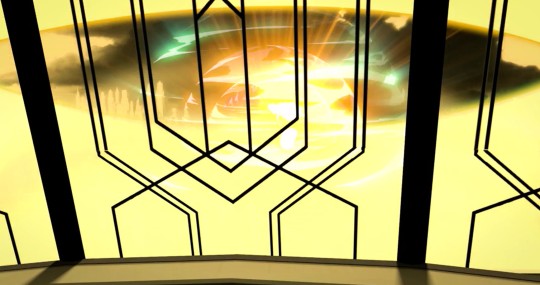
Welcome back, everyone! We had an unexpected break last week due to the horror going on in Texas. I'm glad we did. Not because of any salty "RWBY is bad right now yay free Saturday" feelings, but because keeping to a schedule for a fictional webseries should never take precedence over peoples' safety. I can't believe I need to type that sentence out, but it's true! Over the last seven days I've seen fans who are not merely disappointed by the mini hiatus (understandable) but outright hostile towards the crew because they... were ensuring everyone survived during an unprecedented emergency? Yeah. Given the highly critical nature of these recaps — including today's! — I want to be clear that my thoughts towards Rooster Teeth's creative choices are distinct from any thoughts about the crew itself, including the most basic forms of compassion like, “I sure hope everyone is okay over there.” In an age where it has become horrifically common to harass creators and even send them death threats over stories, it has likewise become necessary to remind people: Don't do that shit. Never do that shit. If I can teach anyone anything at all, let it be that!
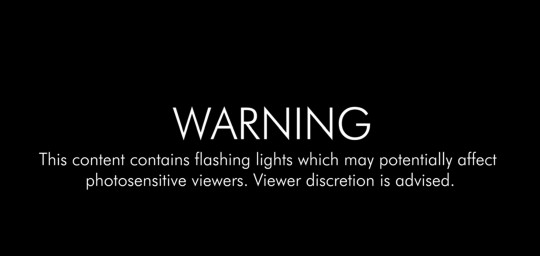
Anyway, dark fandom reminders out of the way, let's dive straight into our delayed episode. It was certainly a doozy. Titled "Ultimatum," we open on a trigger warning for flashing lights. Good on Rooster Teeth for including that, though I do wonder if creators shouldn't be including time stamps as well? Or perhaps a note that you can find those time stamps in the credits, avoiding any (minor) spoilers for everyone else? I'm not photosensitive myself, so I certainly don't mean to speak for that group, but my first thought was, "So how would I watch this episode if I was? Hand on the pause button, hoping I stop fast enough as soon as the lights start?" Hard to do given the surprise nature of the scene. Really, my answer would be, "Wait for the fandom to post warnings of their own, likely including where it happens so I know when to skip" which is perhaps an indication that this information that should be included from the get-go.
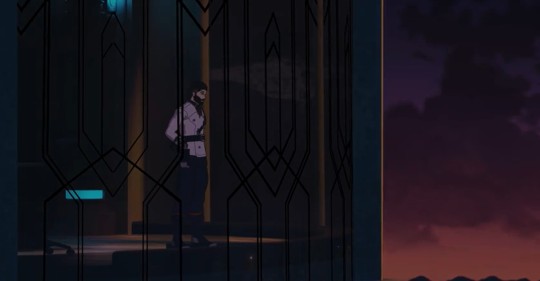
But I am glad the warning exists, regardless. The episode itself begins with a shot of Ironwood looking down at the kingdom. He's used his windows as a vantage point since Volume 7, so that's nothing new, but something about this particular shot reminded me of Ozpin, looking down from his tower. I'm sure the response from many would be simply, "Ah yes, the two power hungry dictators watching over their victims," but I think there's a much more nuanced reading here about leaders being expected to fix the literally unfixable and what that responsibility does to an individual. Of course, it's a nuance that is absolutely obliterated by the episode’s end, but the implication existed for a hot second!
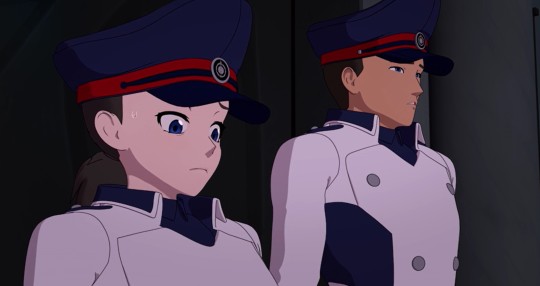
Two other soldiers are in the room with Ironwood, reporting that Cinder has helped Watts escape. They try to soften this with news that they still have Jacques in custody, but receive only a, "I don't give a damn about Jacques Schnee." Which, fair. He's pretty useless at this point. It's when Ironwood learns that both Qrow and Robin escaped too that he really gets mad, something his subordinates have been expecting given their scared expressions.
Now, I'm treading lightly here because I realize how this is going to sound given the end of our episode, but I still want to note that outside of that ending... this is a weird take? Just hear me out. Since Volume 7 the show has worked very hard to make Ironwood seem scary and unstable — bad setup for what we end with today — but the problem is that none of it works in context and it certainly doesn't work when compared to other characters' actions. They are literally in the midst of an unwinnable battle and thousands of his people are dying. If the audience wants a human being — who also just lost a limb and was betrayed by half his allies — o remain perfectly poised and polite during that, sorry, but that's not how human beings work. But even beyond this, what’s the message here? Ironwood raises his voice, so does Yang. Ironwood hits his desk, Qrow hits a child. If we're going to examine how Ironwood handles his stress and anger, he often handles it better than many of our heroes. Namely, by continually taking that anger out on inanimate objects. I kept waiting for him to attack his subordinates or attack Winter this episode, especially given where we end up, but it never came. Ironwood always has enough control to break the desk or punch the wall, not the person in front of him. Which, of course, would not be a good thing in the real world. I want to be clear given these sensitive subjects that if someone is breaking things in your presence that's a major problem to address. But this isn't the real world. This is a fantasy world in the middle of a war, populated by other characters who express their anger by punching people, slamming them into walls, or screaming at them until they run away. The story wants us to fear Ironwood long before he makes his objectively horrific choices and it tries to achieve that by showing us characters who are clearly terrified in his presence, by giving us a string of broken objects in his wake. But those details don't land well when we compare them to other instances of stress. In the same volume I have watched Ironwood take a deep breath to calm himself down when things have gone horribly wrong. I've also watched Weiss start a conversation by threatening her defenseless brother. So again, what’s the message here? It can’t be that acting violently towards someone = villainous behavior because, as established since Volume 6, that’s common for the heroes. Why are these subordinates terrified about Ironwood slamming his fist on a table, but Whitley has no problem hugging the woman who threatened him? Obviously there is a HUGE difference between our main group and Ironwood when it comes to other actions (cough-bomb threats-cough), but these day-to-day moments don't match up. The show wants to use violence as a way for us to easily identify the Bad Guy while ignoring all the times when our heroes do the same thing.
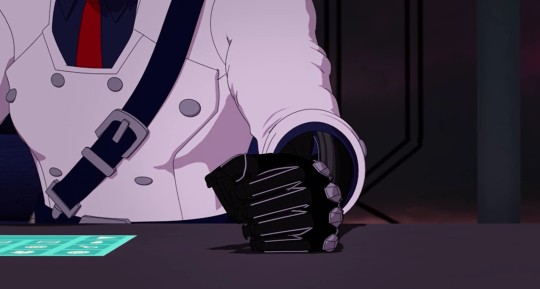
All of which isn't meant to be a defense of Ironwood. As we'll see in a bit, there is no defense for what he's done. Rather, it's a way of acknowledging just how badly he's been written. Why does a man who consistently reins in his anger and takes it out on objects suddenly shoot a councilman for literally no reason? Why does a man defined by wanting to save as many people as he can suddenly threaten to bomb his city? Ironwood's characterization is all over the place, in the sense that they keep writing him as the morally gray, sometimes harsh, but ultimately compassionate man he started out as... up until they need a villain. Salem isn't here yet, so Ironwood can shoot Oscar. Salem isn't attacking yet, so Ironwood can shoot the councilman. Salem is currently reforming, so Ironwood can threaten YJR and Mantle. He's the B-plot villain whenever Salem is out of commission, which is a problem for both their characterizations. This filler doesn't make sense for Ironwood and it severely undermines the threat of Salem. You finally introduce the Magical Big Bad and our heroes are facing more of a threat from a guy with a broken army and three loyal allies left? Hmmm.
The tl;dr is that Ironwood's arc is a disaster and, frankly, it's gotten old reading simplified takes of, "It's just a realistic look at what white U.S. men will do in power sweetie :) " RWBY does not have the context capable of conveying that sort of critical take because our world is not besieged by literal monsters and an immortal witch, to say nothing of how real life good guys do not get deus ex machina canes that fix the problem instantaneously. Ironwood is not an example of anti-U.S. imperialism, he's an example of writers who don't know how to write.
Anyway, I'm getting severely off topic. Obviously Ironwood is a major part of this episode, but the problems demonstrated here are two years in the making. This is the culmination of things I've been discussing for months across hundreds of posts... so I should probably stop trying to summarize it all in a few paragraphs lol. Perhaps when RWBY is over — or Ironwood has died — I'll do a single meta on his character, try to pull everything into one, unified argument.
For now though, we have an episode to analyze.
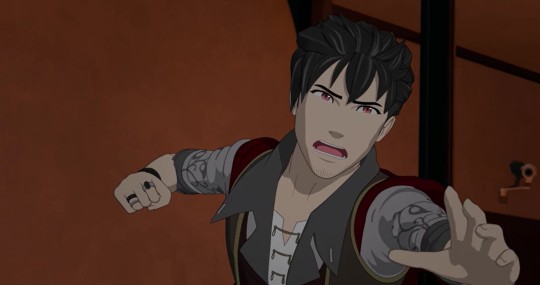
While Ironwood is receiving this news we get flashbacks to Qrow and Robyn. Qrow attacks a soldier in his bird form, which is hilarious. Someone GIF that please. It does raise some interesting questions about this magic though: does Qrow retain his aura and strength in this form (something I thought given his choice to transform during the explosion), or was that soldier just so shocked at being attacked by a crow that he went down easy? We'll never know, because that would require establishing concrete rules for this world. The point is Qrow is going feral in his freedom, throwing punches left and right — did he kill that guard? — while Robyn watches it all from under a rock. They're apparently still somewhere in the facility since all the exits are guarded, but that's not the good thing Ironwood seems to think it is. After all, Qrow is out to murder him. He wants to be there.
We all see where this is going, right? The show is going to ignore Qrow's crazy belief that Ironwood got Clover killed in favor of a "Qrow saved Mantle by murdering Ironwood"/“Qrow got revenge for Mantle by murdering Ironwood” ending. Who cares why Qrow wanted to kill him in the first place now that Ironwood has his finger on the trigger? If RWBY is good at anything, it's writing moments that encourage you to ignore everything that came before it. We'll be seeing more of that in just a bit.
"Damn it!" Ironwood yells, because the show is leaning into its cursing. He orders that the subordinates not return until "you have Qrow Branwen in custody." Here we have another great example of the show conflating what the audience knows with what other characters know. See, we know Qrow has a vendetta against Ironwood. We know their relationship is the important one to the story and that Robyn is incidental. Ironwood doesn't know that. There's no reason for him, as a character, to specify that they only bring Qrow back, but it makes sense for the audience who has the whole, thematic picture. Our understanding of the situation is influencing Ironwood's dialogue, which is... not great.
This entire scene we've had creepy music to hammer home just how evil Ironwood is. Except, as said, he takes a breath to calm down and the music fades. Instead of flying into a rage, hurting someone, or doing anything the music suggests he might, Ironwood calmly calls in for an update — which is when the explosion hits.
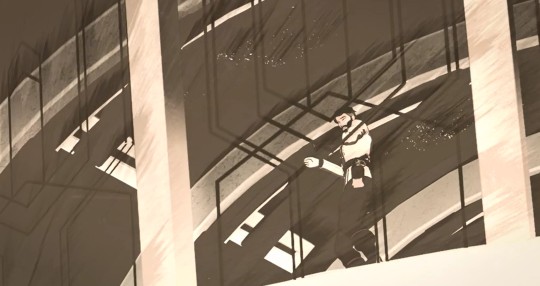
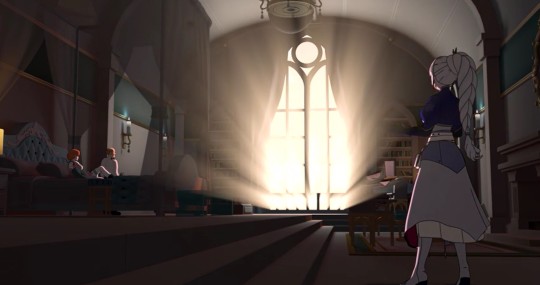
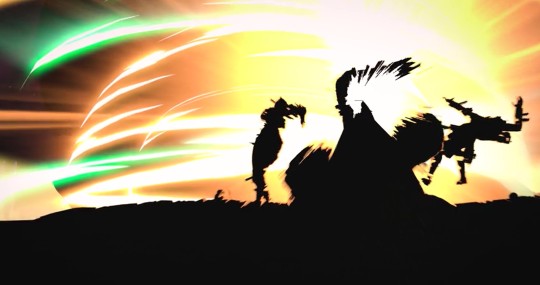
It's MASSIVE, seeming to originate from a lightning strike, which is weird, since it's coming from inside the whale, but whatever. The animation is very dramatic and pretty, as we've come to expect of RWBY, but the actual plot is lackluster at best. It's funny though because I thought for a hot second, when Winter and the Ace Ops were caught in the blast, that RWBY had actually done something exciting. I mean, holy shit! There are the deaths we expect from a battle like this. My god, what is everyone going to do when they realize that Oscar's needless attack took out five characters, including Weiss' sister —
No wait, never mind. They're fine.
Let's talk about that "needless" descriptor for a moment though. Do you all remember, two weeks ago, when I went, "Hey, why isn't anyone telling Oscar that that Ace Ops are approaching with a bomb? They're on a time limit! If someone would just mention that Very Important Information then Oscar wouldn't keep standing around to fight Salem." See, at the time I was frustrated because of how the plot was needlessly allowing Oscar to put himself in danger (especially when the whole point of this mission was to rescue him). Now, I'm frustrated because that same plot needlessly wasted the most powerful weapon the group had. There was no reason for Oscar to use literal lifetimes worth of stored energy when the heroes already had a bomb to do the same job! What was the point of that? I guess he took out the other grimm too, but without the whale that still would have been a challenge with a finite end, one Ironwood's army and the remaining huntsmen should have been able to handle. It doesn't feel justified to have Oscar use a weapon kept on the bench for lifetimes when there was another option literally minutes away.
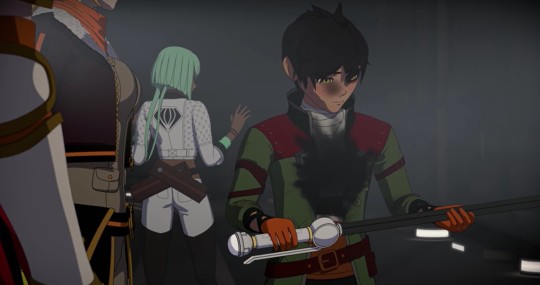
There's so much wrong with this I need another list. So:
Ozpin's cane supposedly stores kinetic energy, which may contradict what we've seen from it before. Regardless, we’ve never heard about this. The all powerful weapon comes out of nowhere
It also begs the question of why Ozpin wouldn't use that power at Beacon and why he wouldn't insist that they try to get their cane back while captured. You had an out this whole time! But we’re going to ignore that because Oscar is a little hesitant?
Which makes YJR's presence even more useless than it originally was, which was already pretty useless. Oscar essentially rescued himself
This kinetic energy miraculously doesn't hurt any people or buildings, just grimm
So what is the point of Silver Eyes? That's been their MO since they were first introduced. Sure, Silver Eyes can be used far more often than Ozpin's cane, but it still feels like a let down to learn that the Big Secret behind this weapon is... the exact same thing Ruby has been doing for years
Like Ruby, Oscar likewise didn't need any practice or training. He just set off this massive attack perfectly and without issue
We have now eliminated the biggest threat to the cast instantaneously — the whale and the other grimm — with no effort from the rest of the heroes. Like the Hound, the stakes are obliterated with no satisfying work on the part of our protagonists
Instead, as said, the actual plan already in place never happened. The bomb just... goes back. Kind of like how Cinder attacked and then just went back to Salem. Penny woke up and then just got knocked out again. We continue to go in circles
This is because no one took two seconds to tell Oscar, "There's a bomb on the way"
Because this threat is gone the show needs a new one, hence Ironwood randomly threatening Mantle with said bomb
The one way we might have justified Oscar blowing up the whale instead of Winter is if he did it to save Hazel, but Hazel is implied to be dead
Maybe he's alive, but if he's not that happened off screen and we're not sure how. It couldn't have been because of the blast itself — everyone else is fine — so what, Salem somehow killed him before she was blasted to bits? While he was holding her?
And there's no body?
Salem was torn apart multiple times during that fight and reformed instantaneously, yet now, conveniently, she's taking her time
None of the characters mention the issues above. None of them admit that there was no reason for Oscar to waste LIFETIMES worth of power when they already had a solution in the works. Fantastic
I need to take a moment to acknowledge that so far this recap feels... bad. Disjointed. Bit all over the place. Which makes a certain amount of sense because that's where my thoughts are at. There's so much going on in this episode — so much wrong with it — that I don't know how to boil it all down into a few, neat claims. This episode is a mess! We're barely a few minutes in and the combined issues of Ironwood's characterization and Oscar's choice have left me reeling. So if you're still reading this, bless your patience, I think we'll both need it for the rest of this journey.
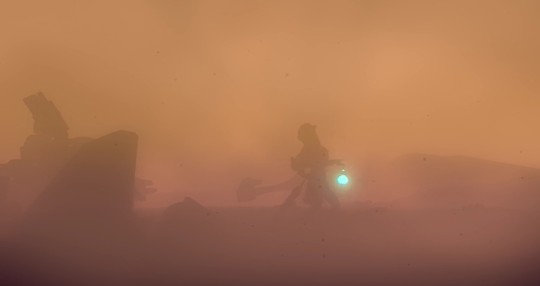
Let's snag a neater plot-point to discuss. Amidst all the chaos Neo literally skips away with the Lamp, clearly thrilled at how her own life is going. Later in the episode she'll text Cinder with the obvious: Salem is going to be pretty pissed when she realizes this is gone. “If you want her name you know what you owe me."
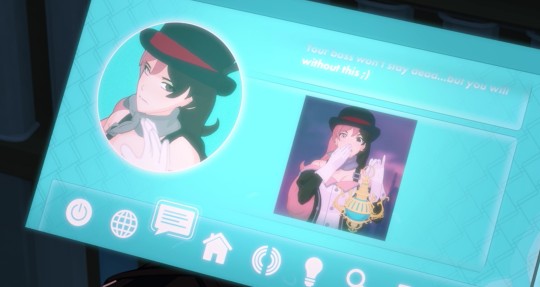
So wait... what is Neo leveraging here? Is she agreeing to give the Lamp back so Cinder doesn't get in trouble with Salem? Give Salem the password she's been looking for? Or give Cinder the password to use the Lamp for herself? What would Cinder even want the Lamp for when she's after the Maiden powers? I'm confused about what Cinder is being blackmailed with. Regardless, she needs the lamp for something and presumably what she "owes" Neo is Ruby. We get a cut to her just to hammer that home.
(Side note: both pictures of Neo are hilarious.)
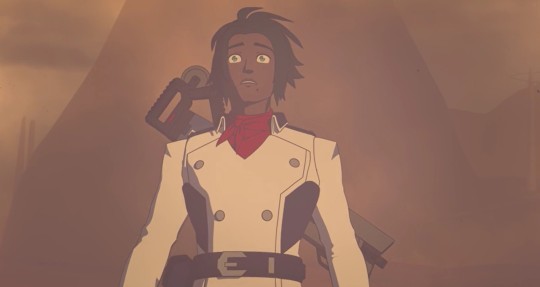
Before that though, back at the whale, everyone is taking stock of the situation when Marrow cries, "Hey, they were still in there!" I feel like this is another scene meant to make him look like the one good guy in the group — he cares about YJOR while the others can’t be bothered — but as always, that reading doesn't fit well with the situation as a whole. The others have barely had time to realize they're alive. I don't think it's a moral failing that they didn't instinctually worry about four betrayers, one of whom attacked them, while they're still checking that they have all their limbs intact. Besides, why does Marrow assume they're dead? The Ace Ops were caught in the blast as well, yet miraculously came out unharmed. They clearly didn't set their own bomb off, so it's logical to assume that YJOR did something themselves. It feels weird to have a "Marrow mourns them and Winter is the only other character who cares" moment when everyone is recovering from bomb shock and no one even knows if the others are dead. But, of course, the show is out to portray only two of these characters as good people, so ignore the logic and run with the emotion of the scene.
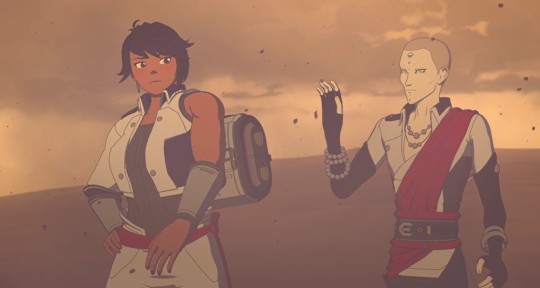
All of which is bolstered by Elm pulling away when Vine puts a hand on her shoulder. Why is she acting cold towards him now? Because they're not friends, remember?
While we get more ridiculous relationship dynamics, Ironwood calls in and congratulates them on the bomb working, but tells them to get back because they have another problem in the works. That would be Qrow and Robyn. Winter decides to tell him about the bomb in person.

We cut to Watts and Cinder watching the remnants of the blast from a rooftop. Cinder has tried calling, but no one answered. Unsurprising, given that Salem doesn't have any other allies left. Cinder says that the plan hasn't changed, she's still going to take the Winter Maiden's power for herself, and Watts can help her by bringing Penny here. He explains that he doesn't have full control over her. Rather, he implemented a virus that is setting her on a single path: open the vault, then self-destruct. Cinder, as one might expect, is furious.
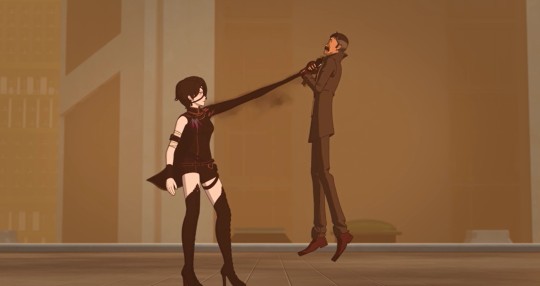
She snags Watts by her grimm arm and threatens to toss him over the side of the building. Thus begins the best part of the episode, hands down. Despite the danger he's in, Watts throws common sense out the window in favor of dragging Cinder in the most satisfying manner possible.
“You think you’re entitled to everything just because you suffered, but suffering isn’t enough. You can’t just be strong, you have to be smart. You can’t just be deserving, you have to be worthy! But all you have ever been is a bloody migraine!”
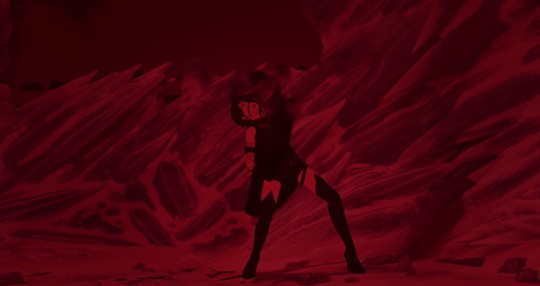
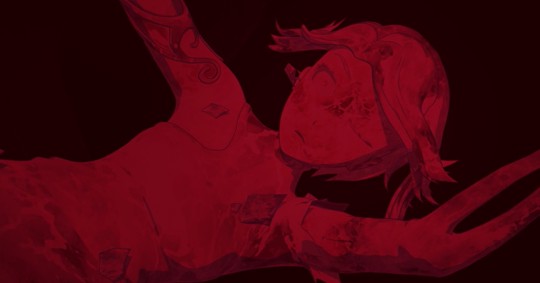
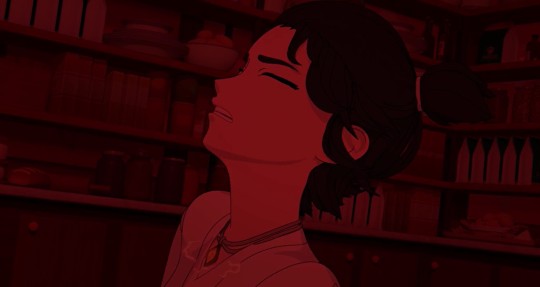
It's true! You know what else is true? This speech could apply to our heroes as well. Accusations of entitlement and reminders to be smart as opposed to just strong hit hard, considering those are the same flaws our protagonists are struggling with. The difference is that Cinder, miraculously, listens, pulling Watts back to safety and going to cry by herself. That moment is simultaneously more growth than Ruby has gotten and more sympathy than Ironwood has gotten. The woman who murdered Pyrrha is treated more kindly by the narrative than one of our initial heroes and our very first villain has taken more time to reconsider her choices than our title character. You know a show is falling apart when excellent choices are applied to the worst possible character.
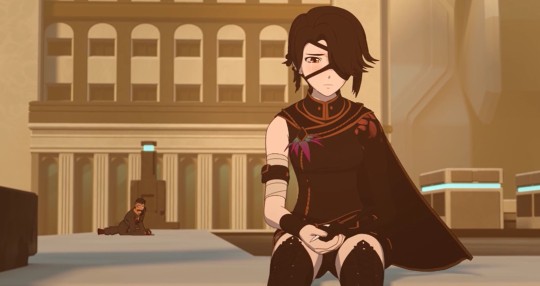
So Cinder is crying while Watts looks guilty and we cut back to YJOR's group post-blast. Yang is finally able to answer a call from Blake who is obviously overjoyed to see her. Weiss gives them directions to the mansion and they ask what in the world they'll do with Emerald, currently on her knees, mourning Hazel.
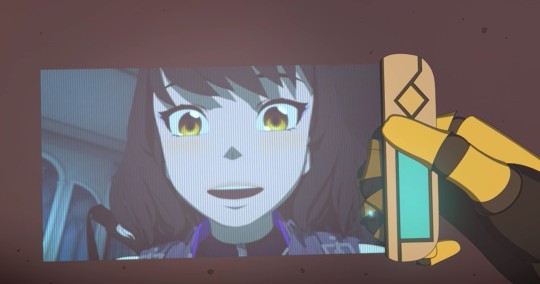
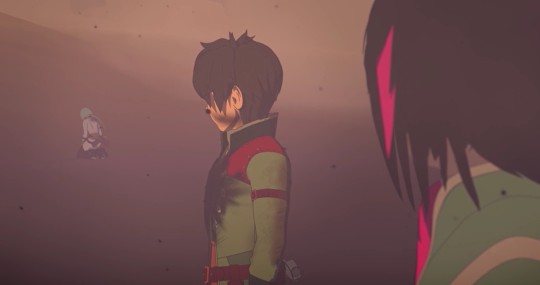
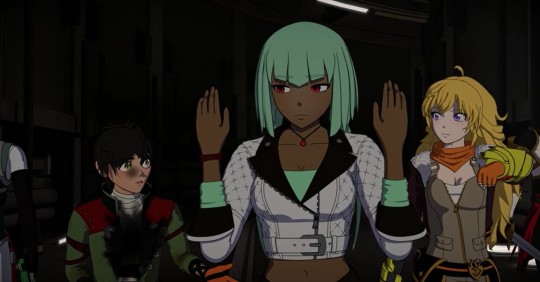
Thus begins the third most frustrating part of this episode. See, on the way back the group continues the conversation about what to do with Emerald, with Yang and Jaune distrusting her vs. Ren and Oscar encouraging cooperation. I can't believe I'm saying this after's Ren's speech and Oscar's entire existence... but I'm team Jaune and Yang here. Look, what Oscar and Ren say — the literal words coming out of their mouth — is nonsense. Ren goes, “We can’t let all of our actions stem from fear," as if Yang and Jaune are being ridiculous for mistrusting Emerald, one of the established villains, after years worth of harm from her. It’s weird that Yang points to her arm as something Emerald is responsible for, rather than being framed or the deaths at Beacon, but the general sentiment of, “She’s done horrible things!” is true. Ren’s perspective is the same simplification that was applied to Ironwood last volume, wherein everyone acted as if he was crazy for fearing an attack on his kingdom... post an attack on another kingdom and pre an attack on his kingdom. Putting generic lines in Ren's mouth about not being afraid makes him sound willfully ignorant, as if choosing to believe that someone is good will magically make them so, to say nothing of thinking it will erase all the harm they've already done.
Oscar at least acknowledges the difficulty here, but then follows this up with, “You don’t have to forgive her… just give her a second chance."

Oscar, honey, that amounts to the same thing in this situation. Allowing Emerald a second chance means working with her, which means trust, which means emotionally reaching a point where these characters can put aside the harm she's done them in an effort to give her that chance in the first place. This actually ties into a post I saw last night, one I've come across before, that claims redemption arcs don't require any suffering on the part of the person who has done wrong. I agree in theory, that prolonged suffering doesn't help anyone, but the problem is that people tend to conflate suffering with consequences and someone who has done this level of harm should face consequences for their actions. The problem with redemption arcs is not that the bad people suffer too much — emotionally and physically beating on them as a form of revenge — but that the people they've harmed are put into situations like this one. If Yang and Jaune let Emerald go like she suggests, they are agreeing that she doesn't have to face any consequences for the damage she's done (which, keep in mind, involves multiple deaths, not including all the lost lives here in Atlas). If they agree to give her a second chance, they are forced to jump straight to some level of forgiveness. We might claim they don't have to forgive Emerald to work with her, but from a practical perspective how are they meant to function, especially during a warzone? Anything she provides them with — information, watching their back in a fight, undertaking missions, etc. — requires trusting her enough to allow those things to happen: working with that info, letting her protect them, allowing her that responsibility. It's all about trust, trust she has yet to earn. In order for a redemption arc to be successful, the power has to be in the hands of the victims. They need to be able to see some justice for what was done to them, be offered some proof that the person in question has truly changed, and have the ability to walk away if they decide no, I don't forgive you, glad to hear you've improved, but please stay out of my life. Jaune and Yang have none of that. There are currently no systems in place for Emerald to face consequences for her choices, she has offered them no proof of her remorse or true motivations, and the other half of the group is pressuring them to give her that second chance without closure or reassurance. None of that makes for a good redemption arc and reducing that to, "So you want to see poor Emerald suffer, huh?" ignores the suffering she has already caused. The group are her victims and they are under no obligation to give her a second chance, particularly under these circumstances, which makes the story's choice to have Ren and Oscar act like Yang and Jaune are being stubborn or inconsiderate a problem. The conversation boils down to, "Give the woman you know to be a liar, manipulator, murder accomplice, and servant of our enemy a second chance based entirely on unfounded faith. If you don't you're letting yourself be ruled by fear."
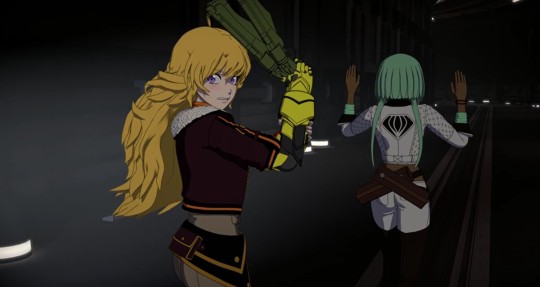
RWBY's touchy-feely themes really don't sit well within its realistic, morally gray premise. We cannot continually have these characters go through hell one moment and then have others accuse them of being paranoid the next. The fact that all of this is wrapped up in the group trusting Robyn, Emerald, and Hazel over their established allies remains beyond frustrating.
Because yeah, you know how Oscar finishes his speech? “I’ve already gotten a lot of help today from someone I don’t exactly trust right now." Meaning Ozpin.
The story is trying to compare Emerald and Hazel to Ozpin.
"Oh hey, I kept a secret from you after lifetimes of watching that secret lead to betrayal and death. I keep apologizing for my mistakes while ignoring that I had no reason to trust a bunch of kids with such world-shattering information and also that you tore it from me in the most traumatic way possible."
"Oh hey, I willingly joined our world's version of the devil and helped her destroy your school, leading to numerous deaths including your friend and headmaster. It was his death that put Oscar in this position in the first place! I then continued to attack your group, leading to another near death of a friend, and a kidnapping, and the destruction of Amity, until I became scared enough to make a run for it."
Which one of these characters is granted an instant second chance? You'll never guess who!
And I do think the word "instant" is important here because just like Jaune and Yang have the right to have distance and justice from Emerald, they had that right with Ozpin too. The difference is they got it. They had the power in the situation, as evidenced by their use of the Lamp and physically attacking him. Ozpin heard what they needed from him — leave us alone — and did that without complaint. They were given months to come to terms with the secrets he kept. They were offered apologies and acts of service to demonstrate intent: saving them in the airship and continually saving Oscar. I don't believe Ozpin ever needed a redemption arc, but even if we think he did, he had it. After three volumes of material Oscar's perspective is still "I don't exactly trust [him] right now" but Hazel and Emerald have earned at least the same amount of trust in a matter of hours? They're really having my boy look at the guy who has tried desperately to do right by him despite unimaginable circumstances, and the guy who tortured him to get information for Salem, and went, "That first guy. He's the one we need to watch out for."
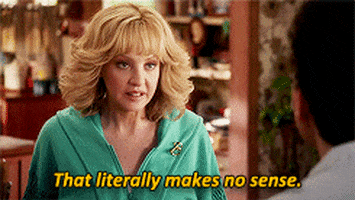
To make things even worse, Oscar tells the others that Ozpin took on all the torture so he wouldn't have to. So he did that and they still don't trust him? If you had told me back in Volume 6 that two years later the group would still be hostile towards Ozpin, while simultaneously urging one another to trust Emerald, I would have said you were lying. RWBY has its problems, but it's not that bad. Yet here we are. I suppose the one silver lining here is that Ren smiles when he realizes Ozpin is back? So at least one of them isn't prepared to draw their weapon at the mere mention of his name.
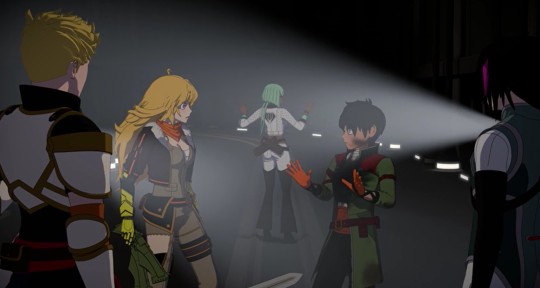
Both these moments raise more questions though. How in the world did Ozpin take on that torture when we clearly saw Oscar getting pummeled for a good portion of the kidnapping? Is that a weird merge thing the story hasn't bothered to explain? I wouldn't be surprised, considering Oscar said last episode he didn't want to use magic because it hastened the merge, he uses the biggest explosion of magic we've ever seen, and nothing has changed. Ozpin is still in the back of his head, thanking him for the tinniest shreds of decency they get. Ren, meanwhile, seems to be back to mindreading. How in the world does he know that Ozpin is back? I assume it has something to do with his semblance, but we don't know what. They could have shown us Oscar from Ren's perspective, perhaps with two distinct emotions swilling around to imply that he sees two different people now, not a useless shot of Emerald with purple flower petals, whatever purple means.
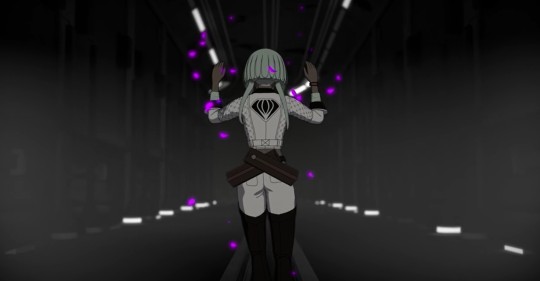
Oh, but no, we shouldn't have gotten either of these scenes. Remember that Ren's aura broke a very, very short time ago? Is it back already? Can he use this part of his semblance without it? Considering it was near impossible to see Ironwood's aura breaking in the Watts fight and we were then mistakenly told he used his semblance in the office, I'm going to go with, "The writers forgot."
Oscar explains that the cane had "lifetime after lifetime" of power in it and though there's still some left, "we have to be careful with how we use the rest." He says that Ozpin trusted his judgement and of course he did! Ozpin also didn’t know that there was a bomb on the way. Yet funnily enough, no one else mentions that, whoops, your choice made in ignorance was a waste and that's due entirely to us prioritizing hugs over basic mission information.
Also, all these explanations take place in front of Emerald. Half the group doesn't trust her, but they'll freely discuss their powers and limitations here. Remember how the group once wanted to talk about magical relics in front of the old lady they'd just met? Yeah, they've learned nothing.
Combine all this insanity with the fact that Ozpin's magic saved the day before Ironwood's bomb could do the same... while Ruby sat in a mansion drinking tea. Who's our hero again?

So things are a hot mess, to put it lightly. Their conversation finally ends when they hear voices and round the corner to find all the Atlas citizens huddled in the subway. For once the show actually writes them in a sympathetic manner, emphasizing how terrified and helpless they are. This image doesn't lead the group to any revelations though, certainly not anything that would tie back to Ren's earlier speech in the snow. No, once again the justified criticisms here are ignored as we hear that “However this fight ends, we could really use someone like you, [Emerald.]” That's it then. Discussion over. We knew as soon as it started that blindly trusting her was being presented as the "right" thing to do and now here we are, deciding that conclusively, despite Jaune and Yang's complaints. By the time the group reaches the mansion, Oscar is defending Emerald from Ruby. We're supposed to just accept that she's a part of the group now, only minimal pushback allowed.
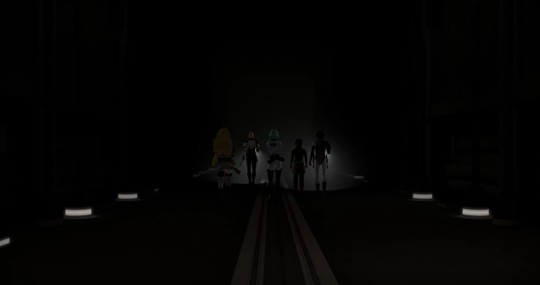
Before that though we return to Ironwood getting news that their bomb never went off. He briefly wonders who else could have done that, but puts the currently unanswerable question aside for what he does know. They still have the bomb and it could be "useful." See, this moment — like shooting Oscar and the councilman — is when Ironwood just randomly goes off the deep end. One minute he's talking about what they've lost and cradling his new arm,
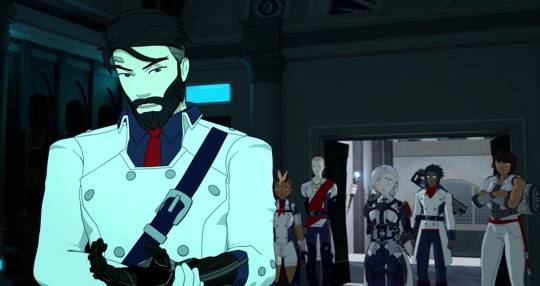
the next he's saying that he should have tortured Qrow to get Penny to obey him! Which doesn't even make sense since I'm pretty sure Penny hasn't ever spoken to Qrow. She wouldn't want anyone to suffer, true, but it's not like Ironwood had a close friend like Ruby to use as leverage. Qrow is just Some Guy to her. Regardless, he thinks Yang, Jaune, and Ren are decent replacements, despite Penny also having no relationships with them. This is what happens when your characters only start breaking up their teams eight years into the story, the response to Ironwood wanting to torture Ren to hurt Penny is, “Does Penny know Ren exists?” But, you know, torture is torture, right? Maybe. Probably not. I mean, if they're going to turn Ironwood into a cartoon villain, they could at least keep him smart.
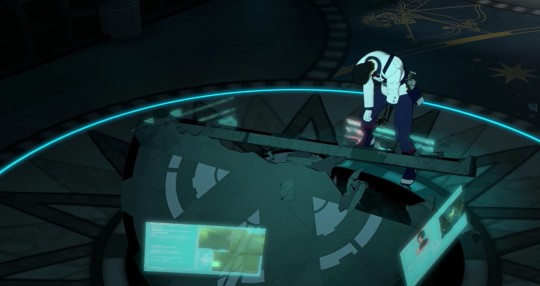
Because all of this is just the height of stupidity. Ironwood wants to torture people Penny barely knows to make her listen (so just grab some civilians? It would do the same job...). Ironwood wants to shoot down empty ships, even though no one, including us, knows where in the world those ships would have gone. Ironwood wants to destroy an entire city to try and save another city. He wants to use a bomb meant for a comparatively small whale and acts like that alone will take out the majority of a kingdom. None of it makes sense! And I know the easy comeback for that is, "Well yeah, Ironwood is crazy and evil" but he's not. I mean he is. Threatening torture and bombings is obviously evil, but he's never been insane, or stupid. As said before, his arc (or lack thereof) is an absolute disaster. The fandom assumes so many things about Ironwood given the opportunity — the whale is a suicide mission. He expects the Ace Ops to die on his order — and the writing hints at so many things that never happen — he's going to hurt his subordinates, attack Winter for disobeying him — and every time what we actually get is a far more compassionate, level-headed character... until he randomly does a 180 and goes, "Let's murder a whole city now!" I never wanted Ironwood to be the bad guy, but they could have at least given me a persuasive decent into this level of horror.
So... yeah. Ironwood has got to die by the end of the volume, yeah? Between Ruby warning the whole world about him and him going into full villain mode, there's no coming back from this.
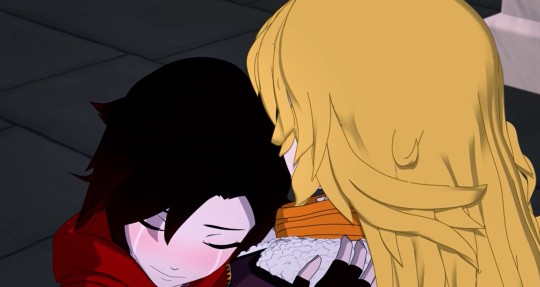
Neo sends her text to Cinder and the group makes it back to the mansion. Remember Yang's criticisms of Ruby's leadership? The ones she conveniently forgot about when Ren started to agree with her? Yeah, those are entirely gone as the sisters hug it out and, presumably, forgive one another for... daring to admit that things are bad? Look, I'm not going to deny that Ironwood's scene with Winter was creepy as fuck,
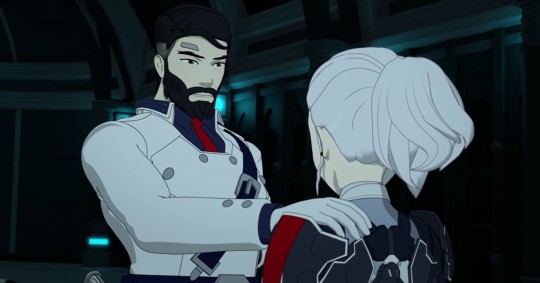
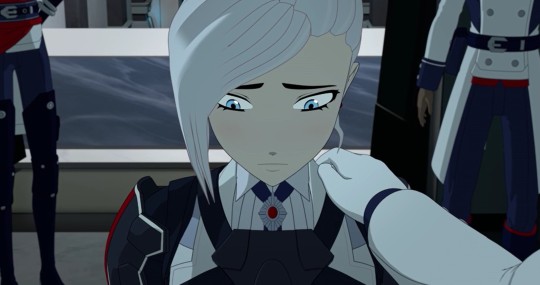
but I'm not of the opinion that the heroes are any better when it comes to the theme of obedience. They've attacked one another, screamed at one another, and any dissent from Ruby's leadership results in the questioner being left behind in the snow. We'll accept you again when you fall back in line. I used to adore the relationships in this show, but watching them now is just discomforting. The show might be 100% more obvious with Ironwood, using creepy music, a smile, and that hand on Winter's shoulder, but the concept of, "Sorry I dared to question you before! We won't ever do it again :)" isn't healthy either. The fact that the show keeps erasing theses problems with hugs — Weiss hugs Whitley now, Yang hugs Ruby, someone will probably hug Emerald soon — doesn't make the circumstances any less uncomfortable.
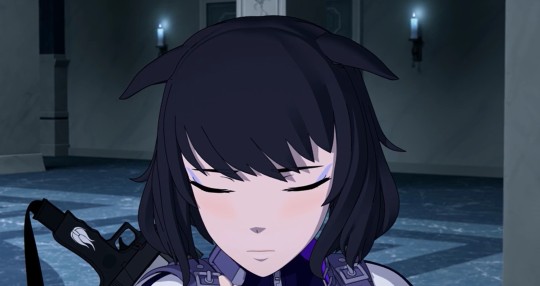
None of this even gets into the Blake and Yang hug. First of all, why is Blake acting like they had a fight and Yang might not want to see her? She's hiding inside rather than rushing to greet them, ears down in a devastated expression until Yang touches her. Combine this with Yang's "Do you think she's mad at me?" and it feels like the writers cut a fight in the final script and then didn't bother to remove the fallout from that. Seriously, where did any of this come from? You can't just have characters act like they've been fighting when they haven’t.
Also, can't forget this.
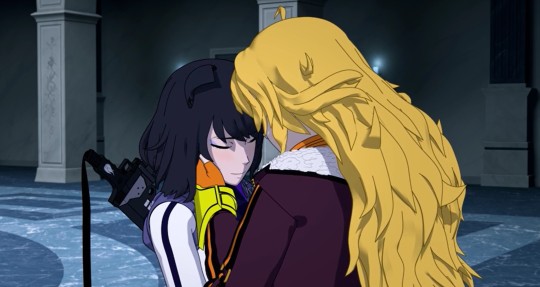
At this point there's nothing more I can say in regards to RWBY's almost-queer baiting. Is touching foreheads more intimate than the hugs Yang gave the others? Absolutely. Is that an appropriate stand-in for overt representation? Absolutely not. This would have been a perfect time for them to kiss. Take out Blake's nonsensical fear and replace it with them both reuniting after their first separation since Volume 5, working under the knowledge that either one could have been killed, finally admitting their feelings. Hell, they don't actually have to kiss. Not all girlfriends are interested in kissing! But they could use the terminology that makes things unequivocally canon. Another forehead touch when we got that in Volume 6? It's not enough, especially not when our straight couples have all been allowed their rep.
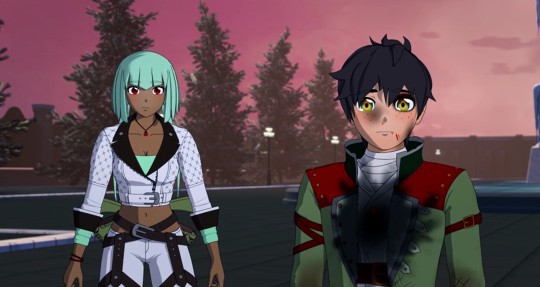
Ren at least wants to know where Nora is. He's presumably told what happened off screen as Oscar tells Ruby that Emerald is their friend now.
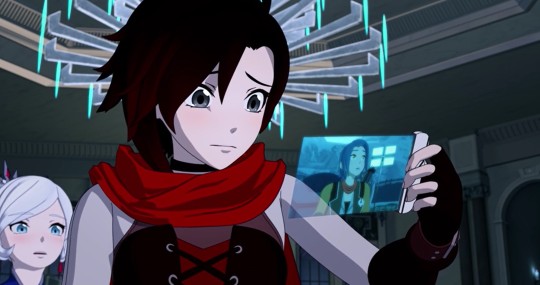
Then an emergency call from May interrupts the reunion and the group learns that Ironwood is bombing the Schnee ships. “Those ships… they were going to save people” Weiss whispers. How? Tell me how they were going to save anyone. Where were you going to take these people where they would be safer than where they are now? RWBY continually asserts things without explaining them, meaning there is precisely zero emotional weight here. Again, Ironwood is far past the point of defense, but I'd be a whole lot more critical of this particular action if I had a better sense of why it's bad. He appears to be endangering the people given May's shout to run — falling debris? — but the further implication is that Ironwood has doomed the people of Mantle by denying them these ships. It's that part that makes no sense based on what we've been told.
Which finally comes to the ultimatum of our episode title: Penny opens the vault, or Ironwood bombs Mantle. Great! So glad this plan is wicked smart and works well for his characterization. It's definitely not a nonsensical, unfounded, overblown change that feels like it belongs in a child's cartoon, complete with dramatic spotlight. Nope. Excellent writing choices all around.
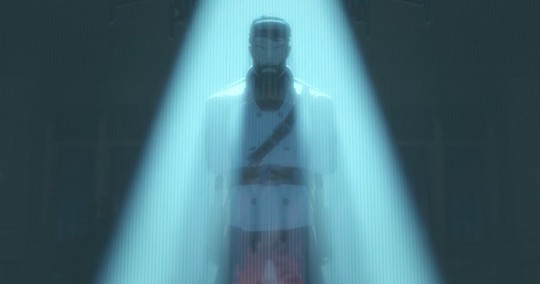
Our final line of the episode is, “I hope you live up to the title I gave you," referring to Penny's job as the Protector of Mantle, and you know what? That line could have been very cool if it was delivered by an Ironwood with a persuasive fall and a halfway decent plan in place. I love that we've twisted the concept of a protector and turned the title into a horrifying, rather than honorable responsibility... I just hate everything surrounding those details.
So, usual RWBY fare.
(At least we get to see that Nora is awake!)
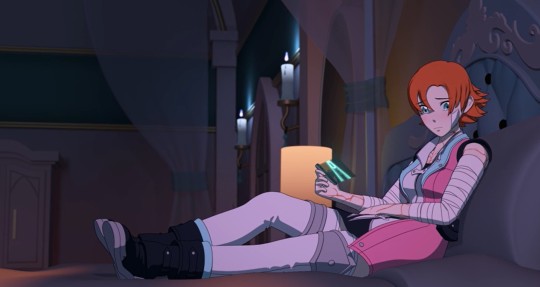
Will things get better over the next four episodes? I doubt it. We're still expecting the rest of the Ace Ops + Winter to ditch Ironwood, someone getting the vault open, the fall of Atlas, now the potential destruction of Mantle, and none of that includes Salem who should reform at any moment. Frankly, I'm not looking forward to any of it. The final leg of a season should make its audience excited to see how everything turns out, not dreading it. I've heard from multiple people that this is the volume that finally got them to drop the show and honestly? I'm not surprised.
As a final (happier?) note: we've finally got a bingo! I completely forgot our board last time, which was a terrible oversight, but we can update it now.
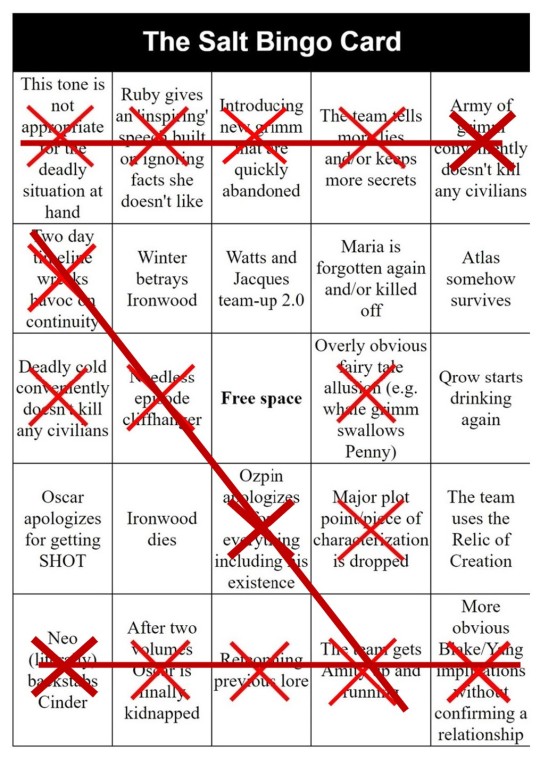
Our army of grimm can't kill anyone now that it got KOed by Oscar (that is the third one hit defeat of a major enemy we've seen this volume. Yes, I'm including the Hound considering it was obviously on its last legs after Ruby's eyes.)
I'm likewise including "Ozpin apologizes for everything including his existence" because he's done nothing but apologize since he came back. The emotion is there even if the literal words are not. Oscar reminded everyone of how untrustworthy he is, but kept the group from jumping them again. And Ozpin thanked him for it.
Neo didn't literally backstab Cinder (shame), but the Relic still counts.
So a triple bingo! Is that how bingo works? Idk, I've never played. I feel like I should have thought up some sort of humorous prize, but sadly I've got nothing. If you think of anything, let me know lol
That’s all then, folks. Until next week! 💜
103 notes
·
View notes
Note
Because all queer men are to you are entertainment. Fuck you, fetishizing bitch.
Wow okay. So let’s begin this lil ask by me actually laughing at the absurdity of this????? Like you whoever you are hiding behind the anonymous icon slid into my dms and made a presumption about me and called me a bitch????? What?? Did that ACTUALLY happen?? 😂😂😂
Second. You know I think fair criticism or just conversations about things you might disagree on is a good thing. We learn from talking respectfully to each other. I’d be happy to have a conversation about fetishisation of mlm ships in fandom (also wlw let’s be honest) because I agree this can be an issue but I also think you have to be mindful that fetishisation, is often done, (but not only) by straight women who hyperfixate on mlm which stems from how women’s bodies as well as their sexuality and desire is policed and have been suppressed by patriarchal social structures for a long time, still is too. It doesn’t make fetishisation okay but it gives you a framework to begin untangling and to begin to understand why it happens. Instead try to have a talk about how women (and non binary and queer people) can be given safe and respectful ways to discover their own sexuality while also acknowledging where this stems from. This is a broader conversation for sure and there are so many aspects to consider but I don’t want to get too bogged down with details so moving on.
Ok my third point. I’m assuming you came at me for this post (https://beeexx.tumblr.com/tagged/if%20it%20doesn’t%20happen%20then%20that’s%20definitely%20not%20true%20to%20their%20characters)
I’m on my phone and it is late and it won’t let me add the link so don’t come at me again for this lol. ANYWAY, I will offer an explanation for this as my original post was so misconstrued apparently. I’m not even a big blog in this fandom, like I am inconsistent so no one pays attention to lil me which is why I never get a lot of notifications. Now, I made this post in a little jokey kind of way I will admit that, though I also think this would fit the characterisation of them as characters and where they are now. Last time in season 2 when they were on call where Carlos says “firefighters you really are a smug bunch” “you love it” they were all flirty and comfortable around each other. The trailer sets up next week’s episode as very serious and parts of it might be though I think the baseball game will be fun and lighthearted with a lot of banter for all the characters, both from the police and the firefighters. Now a potential set up for tarlos is just that they jokingly trash talk each other like the rest of the team only to realise that nah being close and kissing is a much better way to spend our time here. Now this is a couple that has been through a lot recently who are stronger now and finally together after months apart. It would make sense that some of that honeymoon period magic would slip back into their daily lives and going without the other’s touch for so long makes them act a little silly around each other. Who knows? 🤷🏻♀️
I’m gonna leave it at this now and just say this, it is incredibly rude to attack people on the internet in this aggressive tone. It’s scary too that people think they have the liberty to call people they don’t know a bitch out of the blue in a way that feels aimed to be disrespectful and just to hurt. I hope you have a life outside of this website, I really do because yikes this is pathetic. Anyway I hope you have a good day anyway and think more carefully next time before jumping into someone’s dms writing hateful messages.
Peace✌🏻
13 notes
·
View notes
Text
A Non-Definitive and Certainly Incomplete List of the Differences Between the Qianqiu/Thousand Autumns Danmei Novel and the Donghua
@blacktigersprings commented on one of my Thousand Autumn Liveblog posts, asking about the differences between the donghua thus far, compared to the book - they'd seen the 16 episodes, but hadn't read it yet. After I wrote down what I could remember I was like...ya know what, I should just make all this into a post.
This is non-exhaustive. I am a tired person with a bad memory and a lot going on, so I am sure I forgot things. I'm gonna ping @baoshan-sanren since they're the main person I know who is in Thousand Autumns fandom also, and I'm willing to guarantee they will think of things I didn't, and also probably be able to correct me if I mixed anything up. I'll try to edit this based on new info, if I have the time, and I might post it as meta on AO3? I did that with my list of differences between CQL and MDZS and people found it helpful so...yeah. I'll add a link if a do.
Note that all posts like this rely to some extent on interpretation; what I write reflects my interpretation and understanding of events (...to the extent I remember them...) and others may have read/watched the same sequences and reached different conclusions. I've made specific notes where I think I'm raising a point that's more subjective than others.
This contains spoilers for all 16 episodes of the donghua, and for the equivalent parts of the novel. I did my best not to put in novel spoilers for past when the donghua ends, but there are allusions to subsequent events.
Anyway - vaguely in chronological order of when they happen?
(read more)
Overall, the basic premises of the donghua and the novel are pretty different. In the donghua, there are several primary conflicts - the intrusion of the Beimi/Tujue, the competition over access to the Solarity, the competition between different sects' top masters, and the search for that ring that Yan Wushi has. In the novel, these are all things that exist, but they're not the primary plot, and they're all at least somewhat difference. While the novel has multiple plotlines that focus on different things, looking at it as a whole, the main plot is a political one about control of the Empire, and how different sects are pulled into that conflict as a result of how the Emperor relates to Confucian, Daoist, and Buddhist sects. Which tradition each sect follows is much more important and relevant in the novel. The Beimi/Tujue plot is still relevant and involved, but it's just one thread in the political milieu. The Solarity, which has different and long name in the novel that I never remember - it's like, "the complete works of (some master who's name isn't in my brain" - is in six volumes, and it's definitely still important, but it's importance kinda fades as the novel progresses (though it's still a main piece at the point where the donghua leaves off). The ring is basically non-existent in the novel - instead of it being in Yan Wushi's possession, it's in the possession of the woman who's birthday party Shen Qiao goes to (...Madam Su? Might be her name? I'm sorry, I'm not great with names, and I usually rely on fandom wikis but this one is sparse) - in the novel, she was a disciple of Hulugu, and then she stole the ring and returned to the Empire. That other Beimi/Tujue disciple (...Dong something??) takes it back and returns with it to his clan, if I recall correctly, so it can be used to unify those clans to make war against the Empire.
In the donghua, Yan Wushi is just...generally portrayed as pretty nice, and the YanShen vibes start pretty early - there's an early sign of playful flirting from Yan Wushi that actually seems sincere? At least it did to me. As a result, the YanShen vibes feel a lot stronger than they do in the novel at a similar point in the narrative. In the novel...I'd personally say Yan Wushi has zero interest, romantically or sexually, until well after where the donghua left off, and their relationship isn't canon until nearly the very end, and is always left more implied than...outright. I would personally say that in the novel, Shen Qiao has some feels for Yan Wushi pre-Sang Jingxing, but Yan Wushi doesn't reciprocate (except maybe at a deep level he refuses to acknowledge). It's not until he's healing post-almost-dying (as in, during the time immediately after when the donghua leaves off - I'm trying to be vague to avoid giving spoilers to people who haven't read it) that there start to be some real clear signs that Yan Wushi may have caught some feels, and even then it's complicated. They're complicated. They're also complicated. It's part of what I love about them, lol.
In the donghua, the fight between Shen Qiao and Kunye is shown "on screen" instead of only being described afterwards, and it's revealed almost right away that Shen Qiao was poisoned. Also, a lot of people help Kunye and they all fight Shen Qiao together. In the novel, this fight is off-screen. It's strictly a one-on-one battle between Shen Qiao and Kunye, and the reader doesn't learn that Shen Qiao lost due to poisoning until Shen Qiao goes to Mount Xuandu to confront Yu Ai.
In both the donghua and the novel, when Yan Wushi is trying to turn Shen Qiao evil, he sets up a mission for Shen Qiao and Yu Shengyan, The object of this mission is to kill a family that serves the Hehuan Sect. Shen Qiao refuses to participate, and helps them escape. In the donghua, they don't actually escape, and the "they serve Hehuan" thing turns out to be a ruse; they actually serve Yan Wushi. In the novel, they're actually Hehuan spies, and Shen Qiao still helps them, and they actually escape.
(RAPE MENTION TRIGGER WARNING) In the donghua, Chen Gong betrays Shen Qiao when that jerk noble whose name I can't remember right now (and it's not in the wiki, god the wiki is so slim, I wish I had time to help with that) hunts him for sport, and he doesn't want to die. In the novel, Chen Gong betrays Shen Qiao when that same jerk noble, who as a reputation for using pretty boys as sex slaves, tries to kidnap Chen Gong as a sex slave, and Chen Gong is like, "no no you don't want to fuck me, I know someone WAY prettier for you to rape." (The fall out remains the same in both - Shen Qiao beats up the guy, nothing bad happens to him, and he and Chen Gong part ways).
In the donghua, Shen Qiao goes to confront Yu Ai at Mount Xuandu by like. Literally walking up to the front gate. And then all the disciples for some reason get mad that Yan Wushi comes, even though he...also walked up to their front gate. Why do they even have a gate??? In the novel, Shen Qiao uses a super sneaky back way, only known to disciples, and so it actually makes some kind of sense when Yu Ai et al are like SHEN QIAO WHY ARE YOU SHOWING THE EVIL GUY OUR BACK DOOR?
(NOTE this one relies more on subtext and thus is very open to interpretation. What's written here reflects my personal interpretation, and others may disagree). In the donghua, when Yan Wushi hands Shen Qiao over to Sang Jingxing, they have a chat that heavily implies that Yan Wushi is kinda-sorta-not-so-secretly thinking that Shen Qiao could win a fight (and is probably expecting Shen Qiao to do so by using the demonic core that has been implanted in him). Sang Jingxing also says things that indicate that he thinks that Yan Wushi is setting a trap for him. In the novel, while it's never all that clear what Yan Wushi's motivations are, it becomes pretty clear by the point of the Sang Jingxing fight that Yan Wushi was serious when he said he didn't care about Shen Qiao, didn't consider him worthy, and doesn't care what happens to him. He definitely handed over Shen Qiao with every intention of Shen Qiao getting tortured and raped, and had no interest in saving him. Shen Qiao only becomes interesting to Yan Wushi afterwards. Yan Wushi is never only playing one game, so he may have thought that being pushed into a corner would force Shen Qiao to use the demonic core, but it also seemed to me like he genuinely didn't care - he'd gotten bored, and was done playing with the "new toy" that was Shen Qiao.
In the donghua, there is a shot of someone - the clothing is pretty unmistakably Yan Wushi's purple robe of ultimate purpleness - pulling Shen Qiao out of a river after he plunges to his almost-demise in the fight with Sang Jingxing. In the novel, Yan Wushi doesn't pull Shen Qiao out of the water, after Shen Qiao destroys his meridians in the fight against Sang Jingxing. Instead, Shen Qiao collapses in the mountains, where he is found by Shiwu and brought back to the monastery for treatment.
In the donghua, Yan Wushi is fighting the four masters who have it in for him, and before the end of the fight, Shen Qiao arrives and tries to help him; he fights the four masters solo to try to keep Yan Wushi from using his powers and harming himself, and when he's about to lose, Yan Wushi...uses his powers and harms himself. In the novel, Shen Qiao doesn't arrive until after Yan Wushi has been defeated; he finds Yan Wushi almost dead and brings him to a small village nearby, where he stays with a nice girl and her...grandfather, iirc...and tries to keep them safe while nursing Yan Wushi back to health.
In the donghua, it's kinda implied that Shen Qiao goes to rescue Yan Wushi because, like...he likes him? There's not really a reason given, just that he wants to, or maybe to keep the ring from going to the Beimi/Tujue? In the novel it's pretty explicit that Shen Qiao goes to save Yan Wushi because he believes Yan Wushi's position in the Empire is critical to the stability of the world - and he wants the world stable, so that there won't be more refugees, starvation, etc. That he also may like Yan Wushi is the case but is almost incidental; Shen Qiao is focused on doing the most good for the most people, and that means saving Yan Wushi, because Yan Wushi is critical to the Empire, and the Empire is critical to the common people. (this is a major part of the political themes that are more prominent in the book than in the donghua).
I can't actually remember when Bian Yanmei was introduced in the novel? But I was pretty sure it was around when Yan Wushi sends Shen Qiao to that birthday banquet? Anyway, Bian Yanmei isn't in the donghua at all thus far; in the donghua, Yan Wushi's only apparent disciple is Yu Shengyan.
44 notes
·
View notes
Note
I absolutely hear you on a lot of what you said about Rio’s development this season, but I don’t think the show is saying that Nick’s comment about Lucy’s murder is what we’re supposed to think about it. That’s just what Nick thinks, and considering the way they’ve portrayed him, I really don’t think we’re meant to agree with him. In fact I thought we were supposed to do the opposite. Why do you think the show itself is reframing what happened through him? I’m curious in your reading of that
(x)
you know? you make an excellent point. this one also got unintentionally REALLY long, so it is too, under the cut haha
-shout out to @jade-marie and @00gangfriend00, without them I don’t know how coherent this entire response would be haha
Alright, well firstly, I think it’s unfortunately clear that even some of the show’s writers don’t actually have a good grasp on the events leading up to Lucy’s death, both during s3 and now. It seems like depending on who is talking, and the timing of the discussion, the answer will shift. It is… really hard to speculate sometimes when the writers don’t even know the reason behind a scene. However, since it’s canon - whatever the reason or goal of the scene - I’m just going to go on my merry way and create/keep my own interpretation.
The more I thought about your ask, the more I realized, yeah, through Nick’s scripted words alone, they aren’t necessarily reframing what happened, since Nick does seem to be unaware of much of the entire sequence of events regarding Lucy: “So… you were just gunna, what, keep it to yourself?”. Assuming the diner scene with the cop was the first time he heard about it, his impression most likely wouldn’t be a fair representation of what actually happened. So, this is me eating my own words from before, so I apologize for using his quotes to reinforce my idea. This is simply my opinion, and it does regularly change quite a bit… I am wrong a lot haha
To some degree, I think reframing or shifting of some sort is kind of unavoidable when a show continues a plotline from a previous season, especially in addition to incorporating new characters into the past events. Nonetheless, I do think that the show is deliberately in fact reframing Lucy’s death and why it happened - through Rio’s backstory & POVs, Nick’s character development, and the show’s choice to show Rio having a lack of scars.
1. The backstory and Rio POVs
According to the backstory we’ve been given so far, Nick is this person who apparently is so deeply entrenched in Rio’s life and decision-making but he doesn’t know 1) that Rio killed someone, 2) the fact that Rio killed Lucy for Beth (as opposed to killing Annie, Ruby or Beth), and 3) why, which makes me wonder how exactly they are using Lucy’s death as a plotline in combination with Nick and Rio’s relationship. As I said in my previous post, I believe that the events leading up to and including Lucy’s death were heavily tied into if not directly a reaction to the shooting in 2.13.
According to this season, it seems Nick is Rio’s backstory, and Rio is Nick’s. So far, we’ve gotten approximately eight Rio POV scenes, separate from the girls, including flashbacks (excluding the Fitz kill):
4.02:
-the police station
4.08:
-baby Rio (rotten eggs with Nick)
-teenage Rio (the boxing scene(s)/contrasted with Nick’s POV on the golf course)
-teenage Rio (locker room theft)
-teenage Rio (grandma/stove and locker room arrest)
-adult Rio (outside the police station)
-teenage Rio (with Nick, kitchen flashback - I think this is more just an omniscient POV, however)
4.09:
-the boxing scene (with Nick)
With the exception of the police station in 4.02, Nick has been present in some capacity in each one of these Rio POV scenes. Since it’s only been through the flashbacks that we’re getting the main context of their relationship, it’s clear that the storyline the show is perpetuating this season is that Nick and Rio’s characters are very tightly weaved together in some capacity. And have been historically.
Rio, as a teenager, was a victim of Nick’s early manipulative actions, but in the end, it made him money, so (we are able to gather) he was able to justify falling into a criminal relationship with him. After Rio’s six-month stint in prison, he spent (probably) the entire time resenting Nick (and also, this is where he most importantly - in my opinion - developed adult Rio’s mannerisms haha jk).
So, moving forward with this knowledge, let’s take a look at their adult relationship.
2. Nick’s character development (in relation to Rio)
First and foremost, with Rio, in s1-3, he was an enigmatic, charismatic, clever, powerful, king who loved money, was in charge of every decision, well-connected, and a man of few words etc etc. Now, while Rio is being given more facets as more and more of his relationship with Nick is revealed and explored: he is being illustrated as someone who is dependant on his likely long-time abuser. This may be the case, absolutely, but, in my opinion, takes away from the last three years of work the show put into the character Rio mentioned above, including Manny’s nuanced acting. The reveal of Nick’s current power dynamic over Rio (at least the abusive part) in this past episode was quite jarring and seemed incredibly OOC of the Rio I personally know and love from past seasons, and, it kind of came out of nowhere, in my opinion. To be clear, I have nothing against the storyline of Rio being a victim (have you read my fic? haha), but I think that the way they are progressing this storyline is too abrupt and lacks the subtleties that I would have preferred to see with something like this. Especially considering this is canon.
Returning to the original point though, by assuming this abuser/abused dynamic is where the show is taking Nick and Rio’s relationship, that means that Nick likely seeks to control Rio’s life and decisions as much as he can (props to @00gangfriend00 for this articulation). Related and important side note: @jade-marie pointed out to me that by setting a preceding occurrence of physical mistreatment, the show is (unintentionally) establishing Rio as someone who is stuck in a cycle of abuse, and who seems to seek out abusive relationships and probably misunderstands abuse as intimacy. Rio’s relationships with both Beth and Nick demonstrate this. How much shit they’re both clearly able to get away with, and still have power over him. Which I think is an incredibly problematic message to be sending. This is a critical point, especially regarding the scars/acknowledgement of the shooting, because it offers the writer’s an excuse to write off the entire shooting, and by doing so, they are validating this cycle of abuse. (I won’t apologize for this particular tangent, because I really hope the writers acknowledge the damage this storyline could do if they don’t properly see it through this season)
Since it was confirmed that Nick didn’t know about Lucy (even though Rio supposedly got the alibi of the boxing tickets from him) Rio was, presumably, hiding the true extent (or the entirety) of his relationship with Beth from him. Which - I think from a writer’s perspective - does benefit the show, if they choose not to circle back to the shooting. This also allows them the freedom to ‘pretend’ that Rio got over it by himself. Obviously, there are a lot of issues and plot holes with that in itself, but to me, because Lucy’s death wasn’t something that Nick already knew about, combined with the lack of clarity of who Beth is to Rio in Nick’s mind - he doesn’t know about either the shooting or the consequences of it.
3. The lack of scars
Alright, so lastly - the show’s decision to not put scars on Rio. I think this was absolutely a conscious decision, there must have been at least one person in the building that thought of the fact that a shirtless Manny without scars couldn’t just be brushed aside. As a result, I, personally, think this demonstrates that the show is done with shooting. Pretending it never happened, erasing the trauma, moving on, yeah. Obviously, as I said, I vehemently don’t agree with this direction but I think it’s clear it’s a storyline the show doesn’t want to circle back to. Otherwise, Nick would know about Beth and Rio’s history. Otherwise, Nick would know about Lucy. Otherwise, there would be scars. This is my own opinion of course, but I’m making it based off of a couple of Nick’s lines: “Did you [kill Lucy] for [Beth]?” and in 4.08 when he talks to Beth, “So what’s the deal with you and [Rio]? […] Anyone who wears a cardigan, shouldn’t be doing what he does.” He generally seems unaware of the true state of Beth and Rio’s history and is probably genuinely curious about it considering the amount of control he has (or wants to have) over Rio.
I think that because all of the Rio POVs we’ve had are linked to Nick, I made the jump that we are supposed to believe Nick’s influence is/was at the heart of many of Rio’s decisions in the past. Obviously, during s2 and s3 writing and production, they didn’t actually know they were going to get a s4 or do a Rio backstory, so the fact is, that the character they wrote called Rio then, was someone entirely different from today’s Rio. However, we’re watching different seasons of Good Girls, not a different show from one year to the next. I think because this is the backstory we’re getting, the show is implying that this was the case all along. That s2 and s3 Rio made all of those decisions with Nick, someone he was scared of, hanging over his head in some capacity. Or somewhere in his vicinity. That’s why I have a problem with the implication that Lucy’s death was phrased the way it was, without the scars present. They coated that dialogue with innuendos about Beth and Rio’s sexual history, which is also quite layered, but at least that connection I get. It reminds us that Rio was betrayed in more ways than one. However, without the scars present, and Nick seemingly unaware of the shooting, how does the show intend to justify Lucy’s death with the audience? None of it makes sense. Jade was so incredibly helpful; she cohesively summarized the events - by erasing 2.13, they are erasing Rio’s motivations for 3.05. I just want it to make sense 😩
30 notes
·
View notes
Text
my goal-setting manifesto
So recently @woodswit wrote a super thought-provoking post about struggling with the benefits of loving feeling fit and struggling with external validation regarding fitness and so this is kind of my reference guide for myself about goal-setting and the way *I* need to remember to think about it.
I minored in a very specific form of organizational management in college and a huge part of that curriculum was goal-setting. We were encouraged to make one-year, five-year, ten-year career plans, we learned how to set SMART goals, how to identify what steps were right for you, etc. Well, babies, I did not need this curriculum because in high school we had done this exact same curriculum. SMART goals, college planning, etc. Bitch, I knew how to plan my life and, bitch, I had it planned. I was a very high-achieving and ambitious student—I went after awards, AP scores, good grades, letters of recommendation. The school system I attended was very typical of an American school in that those things were the primary indicators for success and the “quality” of our grades determined our classes (and subsequently our social groups) and myriad other things. I was a “good girl” and bought into and benefitted from this kind of structure immensely.
Well. I also have struggled with severe anxiety and periodic depressive episodes that significantly interrupt my daily life and ability to care appropriately for myself. These disorders reached a critical mass at the midpoint of my college career and, after two very bad semesters (one of which ended with me getting a tiny sexy scar from fainting into a doorway), I realized I needed to make significant changes to my priorities. More specifically, I needed to examine the method by which I was defining and collecting achievement and validation. So, after much therapy (I love u Claire), soul-searching, several glasses of a very good local hard cider, I decided to write out the way I goal-set now that enables me to actually breathe and not spiral into self-hatred.
Why Do We Need Goal-Setting?
I actually think that goal-setting is deeply important. If you are a dreamer, I would even say that goal-setting is essential. Personally, I’m a planner/dreamer and enjoy setting goals. It comforts me. Getting a little organized around amorphous ideas like “I want to be a novelist” or “I wish I could travel the world” allows those things to become attainable.
Process and Product
I would say that there are two ways of thinking about goals:
1. Product-Oriented: This is the type of thinking that was taught in my management classes and is exactly what it sounds like. If you do these steps, then you will get x-result. An example of a well-written product-oriented goal is, “By Tuesday, I need to complete three research reports.” (This is true, and I completed them today motherfuckers.) It’s concise, attainable, and happens within a set timeframe.
2. Process-Oriented: This type of thinking focuses on what you will learn or benefit from accomplishing an activity. When I was teaching preschool, an example of this would be taking the kids for a nature walk or free drawing, basically doing an activity where there is no expected result. There is nothing to achieve, there is no medal. The work and the discoveries you make doing the work is the reward. A process-oriented goal would be, “I want to learn about characterization from writing this story.”
In woodswit’s example, she talks about the benefits that cardio exercise has on her mental health, how much happier and confident she is when she is doing a certain variety of exercise regularly. She also talks about how she used to do intense sports.
In this case, a product-oriented way to frame that discussion would be, “I want to get back to the weight I was when I was playing sports” or “I want to be able to lift fifty pounds again.” You will take smaller steps to reach that product—changing the way you eat, figuring out a plan for to work up to lifting heavier things. But the product-oriented way is ultimately a binary—you will either be able to lift fifty pounds or not, you will either reach the weight you were or you won’t. But the process-oriented way to think about these things would be, “I love biking and want to do more of it. Every weekend this summer, I will bike a different rail trail in my county.” The process-oriented method is less specific, but it takes that pressure away from your performance—in the biking example, the only expectation that is set is that you’re going to travel to different bike trails, not that you have to go to every rail trail in the county or that you have to complete the whole trail when you go or that you have to do it in a certain time, just that you are going to go.
There is space for both of these methods, and they are best used in conjunction with each other. Product-oriented is useful, especially in financial situations. A goal for 2022 is to visit my childhood best friend in her new home, halfway across the country. Say I want to go in May 2022 and I figure out that it will cost me roughly $2000. I should probably set a goal with steps to save $2000 by May. It’s also beneficial for the smaller steps to bolster your path to your big dreams—When I was a kid, playing piano gave me a lot of discipline and I would like to have that habit again. That is a process-oriented way of thinking about playing music, but you will probably need to set smaller, product-based goals to achieve it—you will need to select a song and learn to play it, within that song you will need to master it measure by measure.
When we are trained to reach for product, it is hard to recognize the value of process-orientation. A phenomenal example is my WIP. The story I am writing now has 3% the amount of kudos as my biggest fic. I also had a goal of updating every Tuesday. By product standards, that story is a flop. It has the least amount of engagement of anything I’ve ever written, and I haven’t updated it in like two weeks. However, why do I write? I write because I enjoy it, I write fanfic specifically to practice new skills. This story has stretched my abilities and I’ve grown from working on it. By process standards, it’s the most successful of my fics.
And in terms of bigger life things? Process-oriented is the way to go. Why? Because if the pandemic taught us anything, it is that life is not linear. It is nearly impossible to set a straight path—be it up a corporate ladder or a fitness goal—why? Because life sucks. Someone dies, you become ill, it rains, you fall in love, you fall out of love—minute inconveniences happen every day. Process takes the pressure off of your performance because you can’t perform all the time. This is essential in fitness goals because our physical state is especially ephemeral. Of course, it happens in other areas of life, too. An example: In the autumn of 2017, I fell into the deepest depression I have ever been in before or since. I could not remember to shower, let alone do my anthropology homework. As a result, for the first time, I was struggling to create the basic products—like, you know, homework—expected in my classes. That was even more devastating. Around the midpoint of the semester, I realized that product was not sustaining me and if I didn’t want to drop out or harm myself when I “failed”, I had to change my approach.
Once my classes became less about “I need to feel my Middle East studies requirement so I can get a History degree and get an A so I can get on the Dean’s List,” and I reconnected with, “I want to learn a lot about the Middle East,” the products came more naturally. They came more imperfectly, too, but I was able to complete the product because I put less pressure on making them to a certain standard. It became easier to recommit to my goal of being a college-educated woman when I remembered the why of receiving a college education. In woodswit’s original post, she acknowledges that the definition of intense exercise is different for every individual. But it’s also different for the individual at different points in their life and recognizing that intensity and success are arbitrary standards is an essential part of reframing your goal-setting as being process-orientated.
How Do I Goal Set Now?
I still goal-set and a lot of my goals could be likely defined as product-goals. However, they are all made with a long view in mind—if I set a goal to run a 5K, what am I going to get out of it besides just saying that I can run a 5K? Here are ways that I stay process-oriented throughout:
1. Goal Periods
I have three times of year when I set goals: January, June, and Lent. I will set a date on the calendar every year to sit down and just think about what I want to accomplish just in the next twelve-month period and what vision I have for myself in three to five years. No more than that.
January is when I set my personal goals and June is where I set my professional ones. I keep a spreadsheet throughout the year of experiences I would like to have. I will look to this list for inspiration. In January and June, while goal-setting, I check in with the opposing goals. So, in June, I checked in with my progression on my personal goals. I rethought if those goals were still realistic and if I was benefitting from them and in what ways. Then I recommitted to them or adjusted them to help me reach them.
2. Holistic Goals
Unless it’s curing cancer, there is no single goal worth putting all the rest on hold for. Each goal is a battle, and your life is the war. This is a deeply privileged example but: the goal of living independently the first two years out of college was probably achievable. But the effort to achieve that one goal meant that, like, six other personal and financial goals would not be met. So, I put off my career goals and stayed at home and taught preschool for two years. It meant a delay while it seemed like my other friends were growing up and achieving at faster rates, but the temporary strain of achieving a particular goal is sometimes worth it when it dominos into other opportunities.
3. Goal Bundling
I bundle my goals now as a part of my goals check-ins. An example of this is: I loved studying abroad and would love to spend more extended time in the country I studied in during undergrad. I would love to go to graduate school. Ipso facto, presto change-o, I should look at graduate programs in that country and see if that is an achievable goal.
This post is a good example of all of this lol. Why did I write it? there won't be an audience for it but the process of setting all of these thoughts on to paper was cathartic, creating a reference guide on this topic for myself when I am depressed is important, and that has to, has to, has to be good enough.
14 notes
·
View notes